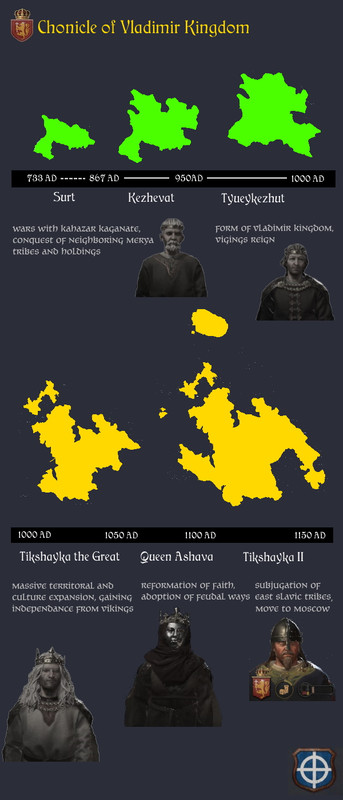Sure, but her life was indeed full of misery.Well, suicide is never a great option.
Russian Path (Suomenko Mega Campaign)
- Thread starter Gamov_Andrew
- Start date
-
We have updated our Community Code of Conduct. Please read through the new rules for the forum that are an integral part of Paradox Interactive’s User Agreement.
You are using an out of date browser. It may not display this or other websites correctly.
You should upgrade or use an alternative browser.
You should upgrade or use an alternative browser.
Threadmarks
View all 22 threadmarks
Reader mode
Reader mode
Recent threadmarks
England in XIII century Chapter X. Path of decline Chapter XI. Grand Civil War Chapter XII. Recovery. Russian Tsardom Chapter XIII. Reign of Tikshayka II Chapter XIV. Regency Independance War Chapter XV. Reign of Alexandr Chapter XVI. Choice of the Faith
Chapter V. Timerovo Massacre
Prologue
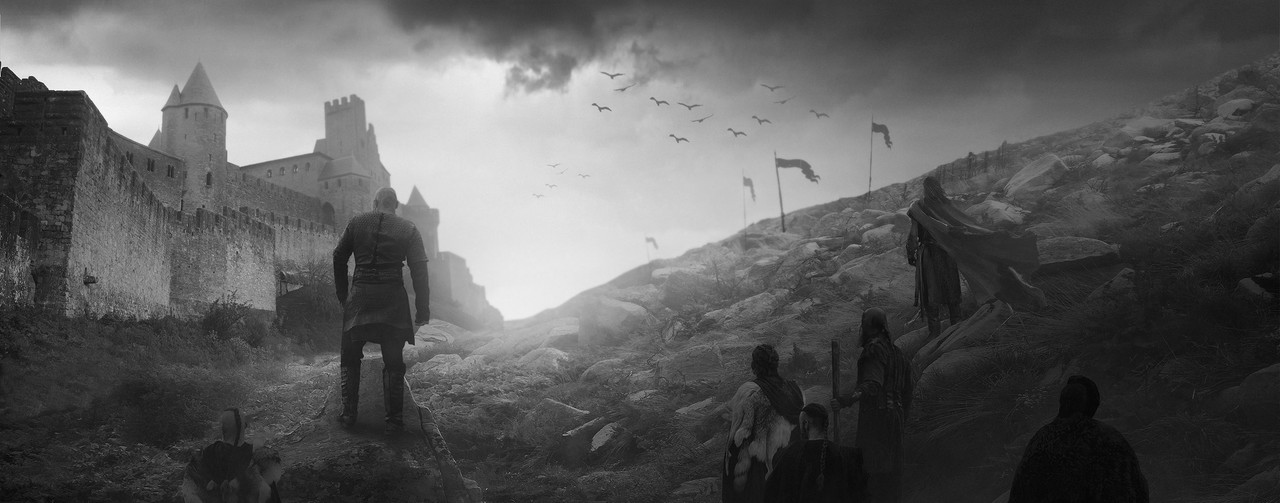
Tikshayka is going through the castle gate of Timerovo. The extremely strong smell of death is everywhere. Tikshayka is seeing ruins of his castle, houses of his courtiers, completely looted domain. But the worst will ahead….. Inside the castle hall, he will see dead bodies of his beloved children that were mutilated.
“Oh Ukko!”
“Why am I seeing dead bodies of my beloved girls lying on the floor”
“And to what do I owe this sorrow ?!”
Chain of events
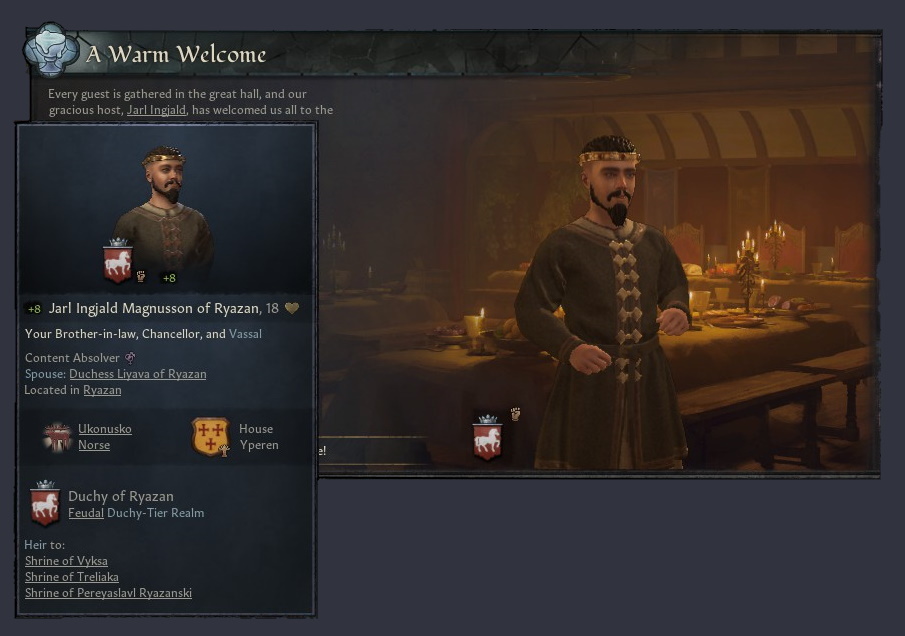
Tikshayka inherited the throne of Vladimir Kingdom after the Ashava’s death occurred in 1110 AD. He was a calm and balanced man who knows how to have a rest at the dinner table. The first fifteen years of his reign (from 1110 up to 1125) Tikshayka was not involved in government affairs. He was too young and lazy. The Council was improving relations with vassals, courtiers and neighbouring powers. Dynastic marriages have been gotten with Lithuania and Finland, the strongest pagan powers on a par with Vladimir Kingdom. After the great challenging reforms of his mother and massive expansion of grandfather Tikshayka had no any ambitious plans. While the King was hunting and indulging in gluttony, Royal Council have been concentrating on economic and cultural development: construction of Farms&Fields, upgrading of Walls&Towers and improvement of the realm roads system. The results of these initiatives have clearly borne fruit.
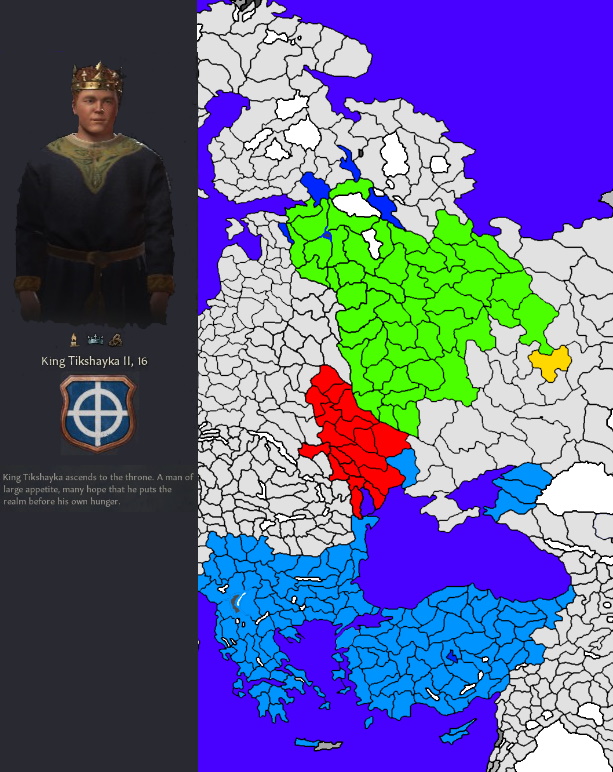
However the physics of feudal system leads to the necessity of territorial expansion. In other words, to survive in medieval ages, conquest is crucial. Despite its strong and power, Vladimir Kingdom remains relative weak and underdeveloped, and the military power continues be heavily dependant upon the number of holdings directly controlled by the King. After the transition to Feudalism issue of generating revenue have become extremely important. Being locked into the forest north-east corner of Europe, Vladimir Kingdom has no access to modern technology and institutions. Our neighbours are also pagan, albeit reformed. They also are highly ungoverned space getting in a state of disorder from time to time. While Baltic sea is “settled” by Suomenko, Asatru and Slavic pagan kingdoms, Black sea could be considered as an interior sea of Byzantine Empire, high powered and the most advanced culture in the Medieval Wold. Conquest of Kiev may lead to fruitful relations with Byzantine Empire, but first it’s needed to subjugate separate Slavic tribes. In the past eastern Slavic tribes settled even near Constantinople, while in 1120s their glory has passed.
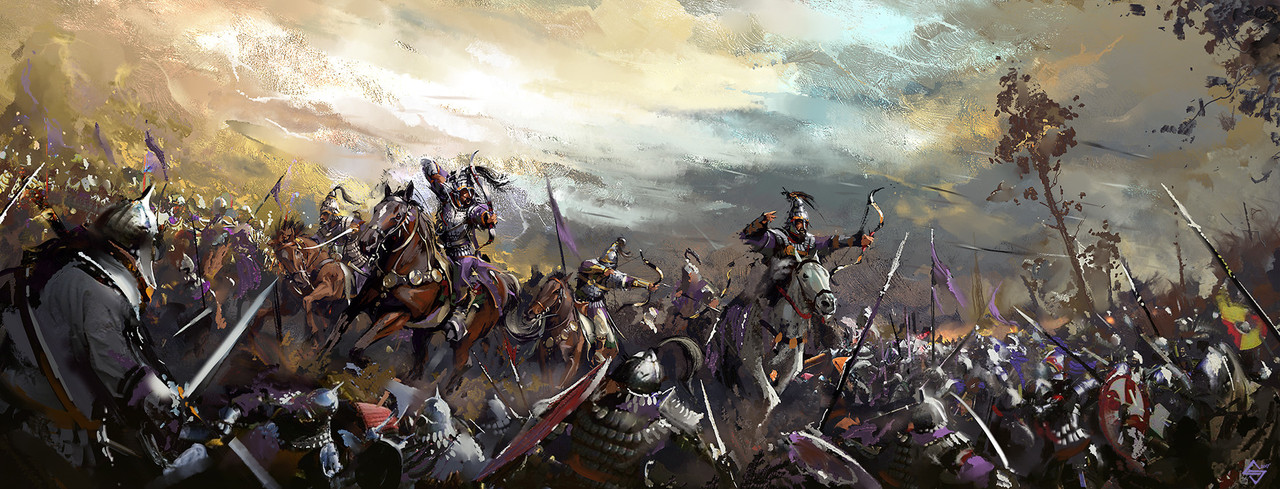
From the victory at the battle of Konotop on 14 January 1123 the subjugation of Slavic tribes was started. One Slavic possession after another were conquered in the following years. Most campaigns were light but the last one was not. Dulo tribe raised huge army of more than 6000 that was only slightly less than the Royal army of Vladimir Kingdom. Chieftain of Dulo tribe turned out to be a skillful commander on his own. He could twice trap the Vladimir forces and defeated Tikshayka’s troops. The war gradually is turning in favour of the Slavic tribes. The troops suffered and the Vladimir coffers are getting empty. At last Tikshayka could encircle Dulo forces at the wetlands of Dnieper. The battle practically decided the outcome of the war in favour of Vladimir Kingdom. The war was win but nothing is worth the sacrifices that were made at the very end of the war...
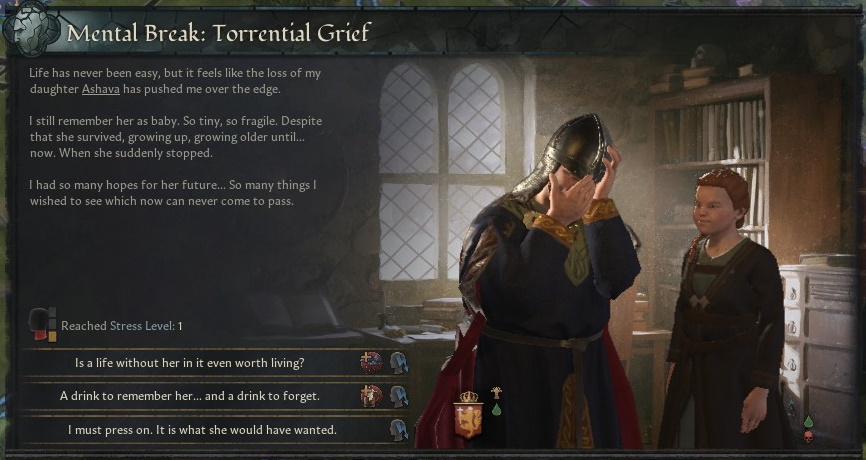
As a consequences of the increase in war taxes, entire villages have been abandoned and cities have been highly deserted. The King aggressively rejected the ultimatum of rural communities and the Peasant Rebellion broke out in 1135. First Tikshayka didn’t give the rebellion much thought. How many were there?! Stupid peasants have to pay taxes and pray for the King’s mercy. But this time it started going the other way. The royal army suffered defeat by the Slavic tribes and Tikshayka couldn’t send troops to subdue the crowd. Tier castle has fallen to the forces of Peasants after one year siege. Many of ruined peasants and impoverished knights subsequently joined rebels. Member of the Peasant rebellion increased dramatically up to 7000. After meeting up, they marched south moved to the capital in Timerovo. One by one the messages from Timerovo arrived at the royal camp. Deposits are declining, rebels are too much but defenders are too few. Unfortunately the King is completing enemy’s forces encirclement and could not come to the aid. The squad, sent to distract the besiegers from Timerovo, was dissipated in the countryside of Tver.

On 21May 1137 the rebels reached the castle, they looted the place and kill many of my courtiers. Liyava and Ashava, beloved youngest daughters of Tikshayka, were brutally killed. The wife of king’s oldest son Beate was raped and ripped. She was a daughter of the Finland King, her father was inconsolable. So he has willingly accepted an ally call for the war. United forces of Finland and Vladimir Kingdoms were ready for revenge!
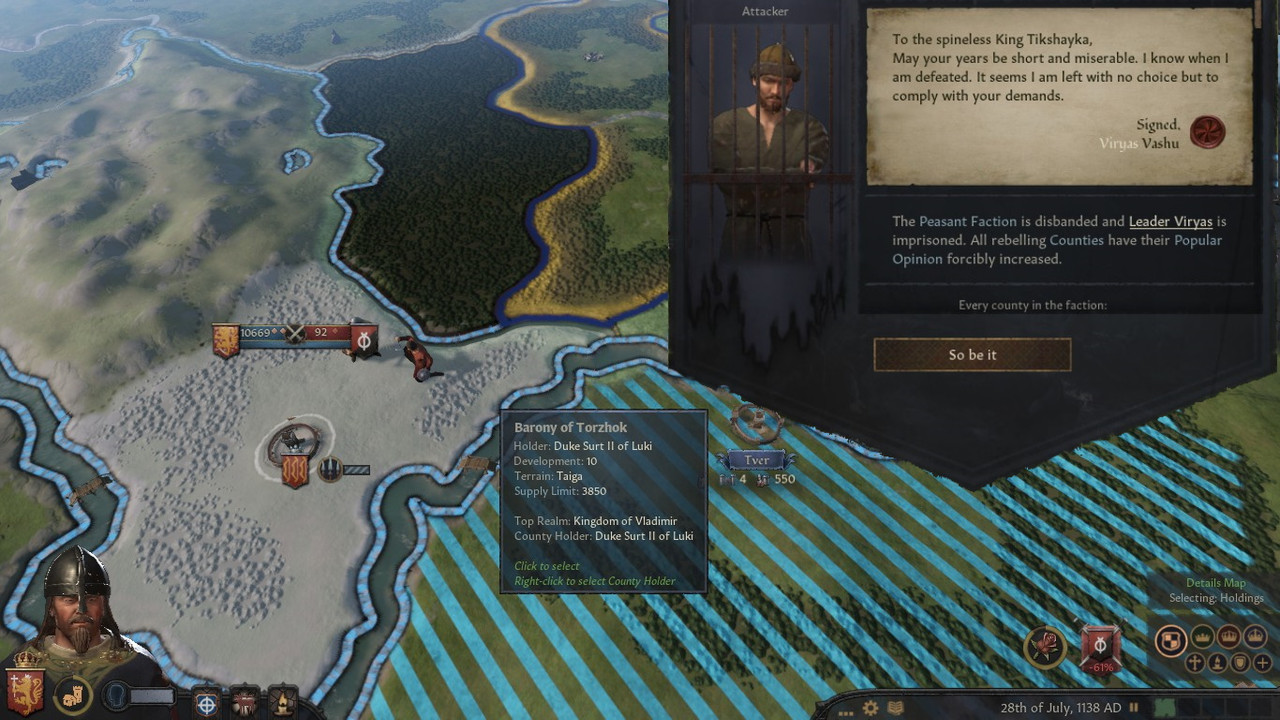
Right after the peace conclusion Tikshayka marched to the Timerovo in order to crush the peasant rebellion. The main battle took place in October 1137 and marked decisive turning point in the course of the rebellion. Peasants were crushed and its head was captured by finish forces. Despite leader of the rebellion Viryas was in prison of Finland Tikshayka decided to kill him. After almost three years plot scheme was succeeded and his rival was assassinated. Tikshayka avenged the murder of his beloved youngest daughters.
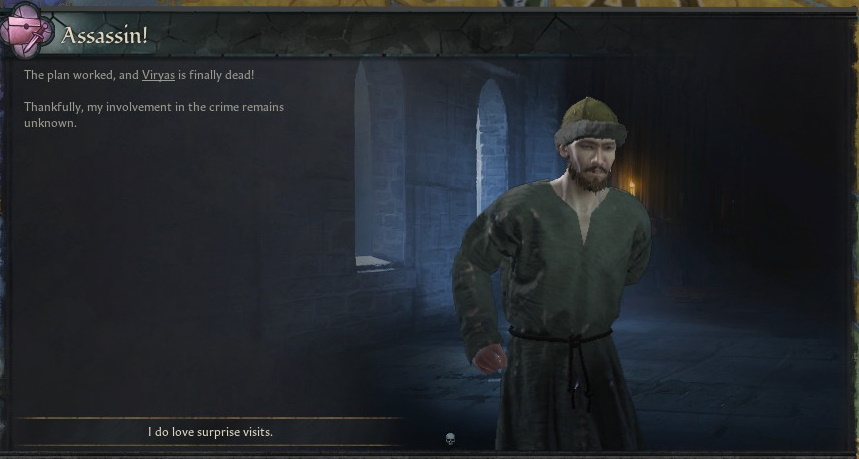
Short but important afterword
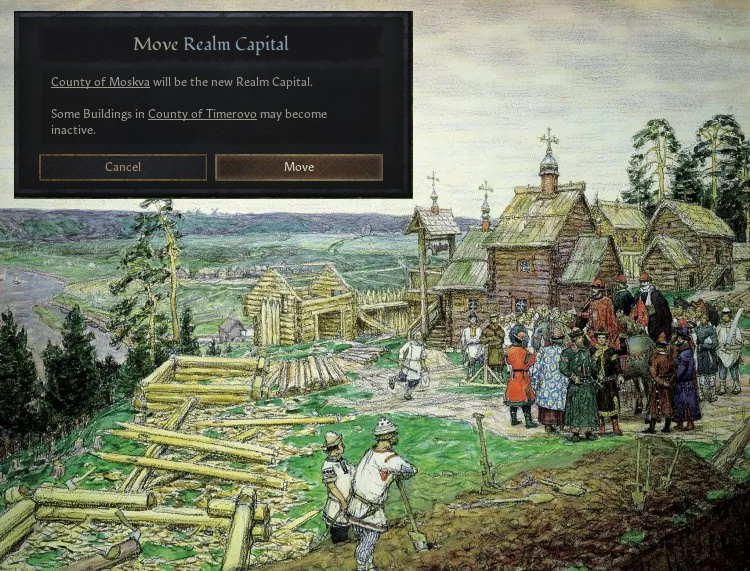
“Yes, my Lord” the Chancellor is standing in the door way of the king’s bedroom.
“I can’t return to the Timerovo, live there” The King said.
“You are right to choose any holdings in yo yr realm”
“Yes, I know it, let it be Moscow”
“A wise choice, my Lord”
"But... what is about Ukko? Why did not he protect my girls?"
"Maybe he is not as strong as we thought"

Tikshayka is going through the castle gate of Timerovo. The extremely strong smell of death is everywhere. Tikshayka is seeing ruins of his castle, houses of his courtiers, completely looted domain. But the worst will ahead….. Inside the castle hall, he will see dead bodies of his beloved children that were mutilated.
“Oh Ukko!”
“Why am I seeing dead bodies of my beloved girls lying on the floor”
“And to what do I owe this sorrow ?!”
Chain of events

Tikshayka inherited the throne of Vladimir Kingdom after the Ashava’s death occurred in 1110 AD. He was a calm and balanced man who knows how to have a rest at the dinner table. The first fifteen years of his reign (from 1110 up to 1125) Tikshayka was not involved in government affairs. He was too young and lazy. The Council was improving relations with vassals, courtiers and neighbouring powers. Dynastic marriages have been gotten with Lithuania and Finland, the strongest pagan powers on a par with Vladimir Kingdom. After the great challenging reforms of his mother and massive expansion of grandfather Tikshayka had no any ambitious plans. While the King was hunting and indulging in gluttony, Royal Council have been concentrating on economic and cultural development: construction of Farms&Fields, upgrading of Walls&Towers and improvement of the realm roads system. The results of these initiatives have clearly borne fruit.

However the physics of feudal system leads to the necessity of territorial expansion. In other words, to survive in medieval ages, conquest is crucial. Despite its strong and power, Vladimir Kingdom remains relative weak and underdeveloped, and the military power continues be heavily dependant upon the number of holdings directly controlled by the King. After the transition to Feudalism issue of generating revenue have become extremely important. Being locked into the forest north-east corner of Europe, Vladimir Kingdom has no access to modern technology and institutions. Our neighbours are also pagan, albeit reformed. They also are highly ungoverned space getting in a state of disorder from time to time. While Baltic sea is “settled” by Suomenko, Asatru and Slavic pagan kingdoms, Black sea could be considered as an interior sea of Byzantine Empire, high powered and the most advanced culture in the Medieval Wold. Conquest of Kiev may lead to fruitful relations with Byzantine Empire, but first it’s needed to subjugate separate Slavic tribes. In the past eastern Slavic tribes settled even near Constantinople, while in 1120s their glory has passed.

From the victory at the battle of Konotop on 14 January 1123 the subjugation of Slavic tribes was started. One Slavic possession after another were conquered in the following years. Most campaigns were light but the last one was not. Dulo tribe raised huge army of more than 6000 that was only slightly less than the Royal army of Vladimir Kingdom. Chieftain of Dulo tribe turned out to be a skillful commander on his own. He could twice trap the Vladimir forces and defeated Tikshayka’s troops. The war gradually is turning in favour of the Slavic tribes. The troops suffered and the Vladimir coffers are getting empty. At last Tikshayka could encircle Dulo forces at the wetlands of Dnieper. The battle practically decided the outcome of the war in favour of Vladimir Kingdom. The war was win but nothing is worth the sacrifices that were made at the very end of the war...

As a consequences of the increase in war taxes, entire villages have been abandoned and cities have been highly deserted. The King aggressively rejected the ultimatum of rural communities and the Peasant Rebellion broke out in 1135. First Tikshayka didn’t give the rebellion much thought. How many were there?! Stupid peasants have to pay taxes and pray for the King’s mercy. But this time it started going the other way. The royal army suffered defeat by the Slavic tribes and Tikshayka couldn’t send troops to subdue the crowd. Tier castle has fallen to the forces of Peasants after one year siege. Many of ruined peasants and impoverished knights subsequently joined rebels. Member of the Peasant rebellion increased dramatically up to 7000. After meeting up, they marched south moved to the capital in Timerovo. One by one the messages from Timerovo arrived at the royal camp. Deposits are declining, rebels are too much but defenders are too few. Unfortunately the King is completing enemy’s forces encirclement and could not come to the aid. The squad, sent to distract the besiegers from Timerovo, was dissipated in the countryside of Tver.

On 21May 1137 the rebels reached the castle, they looted the place and kill many of my courtiers. Liyava and Ashava, beloved youngest daughters of Tikshayka, were brutally killed. The wife of king’s oldest son Beate was raped and ripped. She was a daughter of the Finland King, her father was inconsolable. So he has willingly accepted an ally call for the war. United forces of Finland and Vladimir Kingdoms were ready for revenge!

Right after the peace conclusion Tikshayka marched to the Timerovo in order to crush the peasant rebellion. The main battle took place in October 1137 and marked decisive turning point in the course of the rebellion. Peasants were crushed and its head was captured by finish forces. Despite leader of the rebellion Viryas was in prison of Finland Tikshayka decided to kill him. After almost three years plot scheme was succeeded and his rival was assassinated. Tikshayka avenged the murder of his beloved youngest daughters.

Short but important afterword

“Yes, my Lord” the Chancellor is standing in the door way of the king’s bedroom.
“I can’t return to the Timerovo, live there” The King said.
“You are right to choose any holdings in yo yr realm”
“Yes, I know it, let it be Moscow”
“A wise choice, my Lord”
"But... what is about Ukko? Why did not he protect my girls?"
"Maybe he is not as strong as we thought"
Last edited:
- 2
Still an awful lot of misery in these Russian kingdoms. Will things ever start looking up for Tikshayka?
Life is very unstable in CK3. Everything may change in one time. Uprising of poor peasants, power vassal factions, invansion from steppe or norse sea, plots and so on. I was really suprised when the rebels raised more than 6000 army and looted my capital. Only military assistance provided by Finland allows me to suppress the rebellion.Still an awful lot of misery in these Russian kingdoms. Will things ever start looking up for Tikshayka?
- 1
Sad about Tikshayka's daughters dying...
Also, is that a religious reformation or change I'm seeing?
Also, is that a religious reformation or change I'm seeing?
Reformation of Suomenko faith was done in 1105 AD. Tikshayka hardly is able to change or again reform the faith. But...who knowsSad about Tikshayka's daughters dying...
Also, is that a religious reformation or change I'm seeing?
Chronicle 1150
Very interesting AAR, however I believe it is time to prepare for the Mongols soon as it is just one or two rulers away...
Chapter VI. Mikael: Early years
Mikael I. Early years
24th of October 1149 AD: Election of King
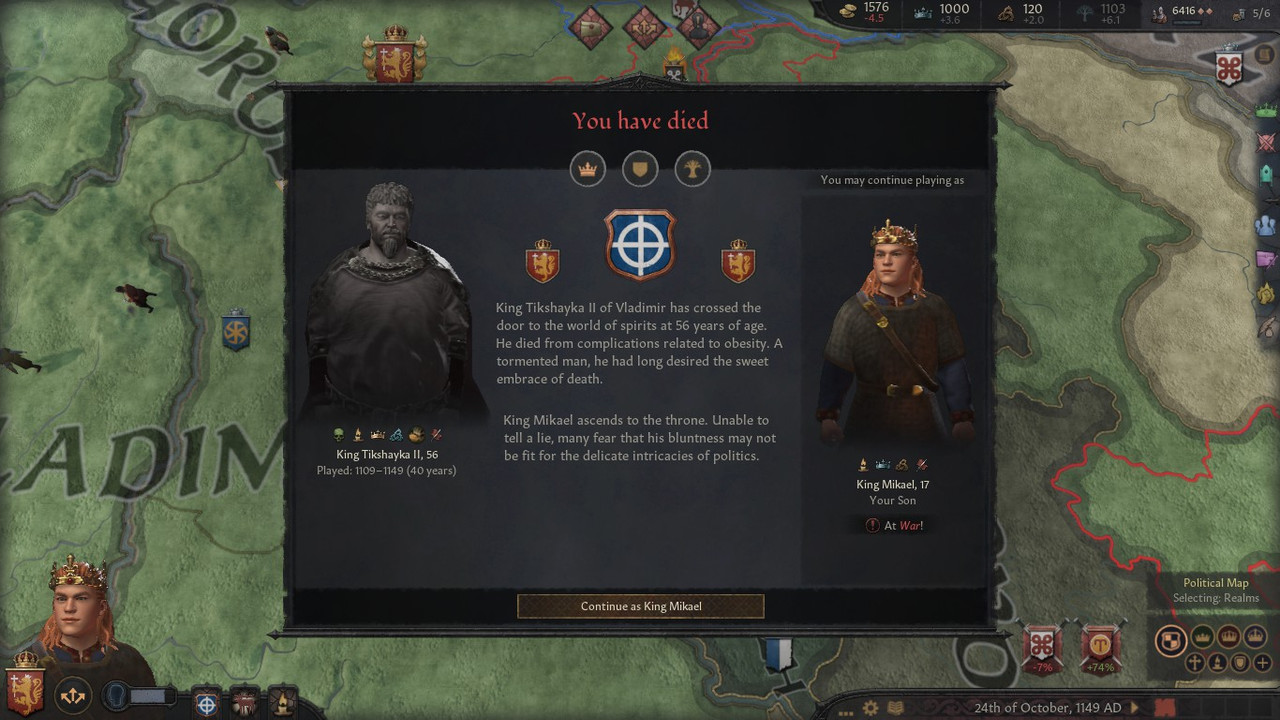
Chancellor - Jarl Bertil Ingjaldsson of Ryzan
“I am authorized to report you that our beloved King is dead”
“As powerful vassals of Vladimir Kingdomб you have to elect King according to Succession Law”
Steward - Duke Varmanpaz of Obran Osh
“Tikshayka II drew up a will of which we have to execute. The King should be his oldest son - Vladimir. He is a wise talented young man who married the daughter of Lithuania’s King. It gets us a strong powerful alliance with Lithuania Kingdom”
Marshal - Duke Surt II of Luki
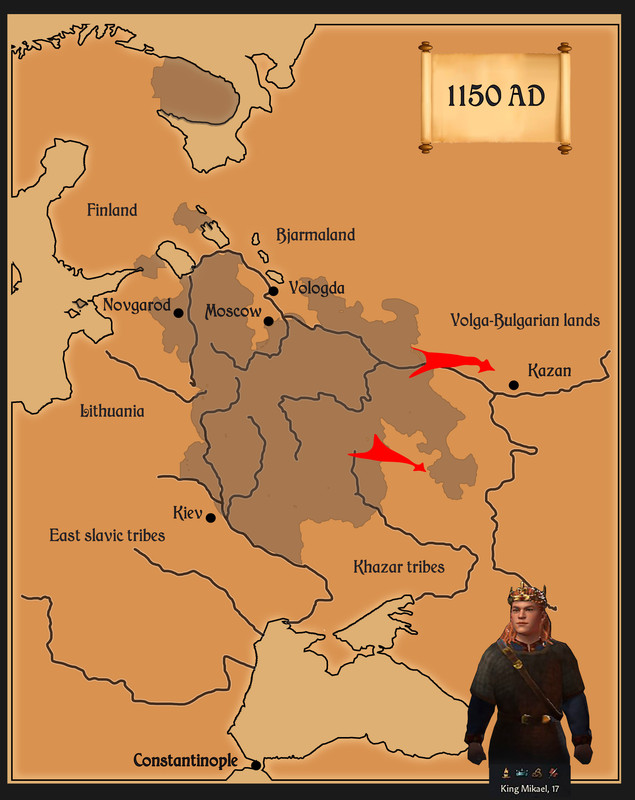
“I talk you, It ‘s nothing. Tikshayka the Fat was a fool. He could scarcely conquerer only three Slavic holdings for almost 40 years in power.”
“His son Vladimir is the same weakling that can’t hold a sword!”
“Please, take a look at the realm map in order to understand what kind of King do we need”
Chancellor - Jarl Bertil Ingjaldsson of Ryzan
“I guess, uh… we should listen to the Marshal. As a duke of Ryzan I am afraid of steppe expanses. The only way is to capture them!”
“Well, if… Vladimir didn’t, then who…”
Spymaster - Pakstyan of Chernigov
“Mikael is the best choice… He is brave, strong and fair. Ideal warrior and maybe King”.
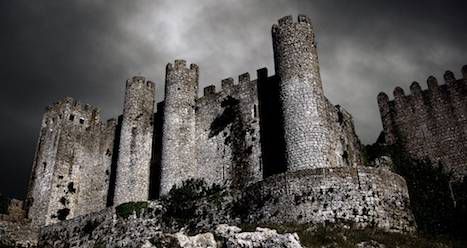
This rainy night, the King has been elected. 17 year’s old young man ascends to the throne of vast Suomenko Kingdom of Vladimir. Countries welcomed their young King hoping for his courage and bravery. Vladimir (failed heir) is going to Novgorod, his own small realm formed after the partition of Vladimir Kingdom.
Alexandra, Queen of Novgorod Kingdom, wife of Vladimir
“Don’t worry my beloved husband. Your brother protect us from the steppe hordes. He can repeal possible invasion by Khazar tribes.
“Novgorod is a well-maintained town, its defence is strong. My father also promised protection.”
Vladimir keeps silence.
7th of October 1154 - 2nd March of 1157: steppe military campaign
After inauguration King Mikael the First goes to the troops gathered near the border with Khopyor, a khazar tribe state. Marshal is waiting for him in the easily improvised military camp. More then 8000 solders (royal guard, cavalry and ordinary troops) have been called from all parts of the Realm. The military plan developed by the Council implied decisive battle and siege of vital holdings of Khopyor tribe. Enemy armies should be defeated separately, we have to prevent them connecting together.
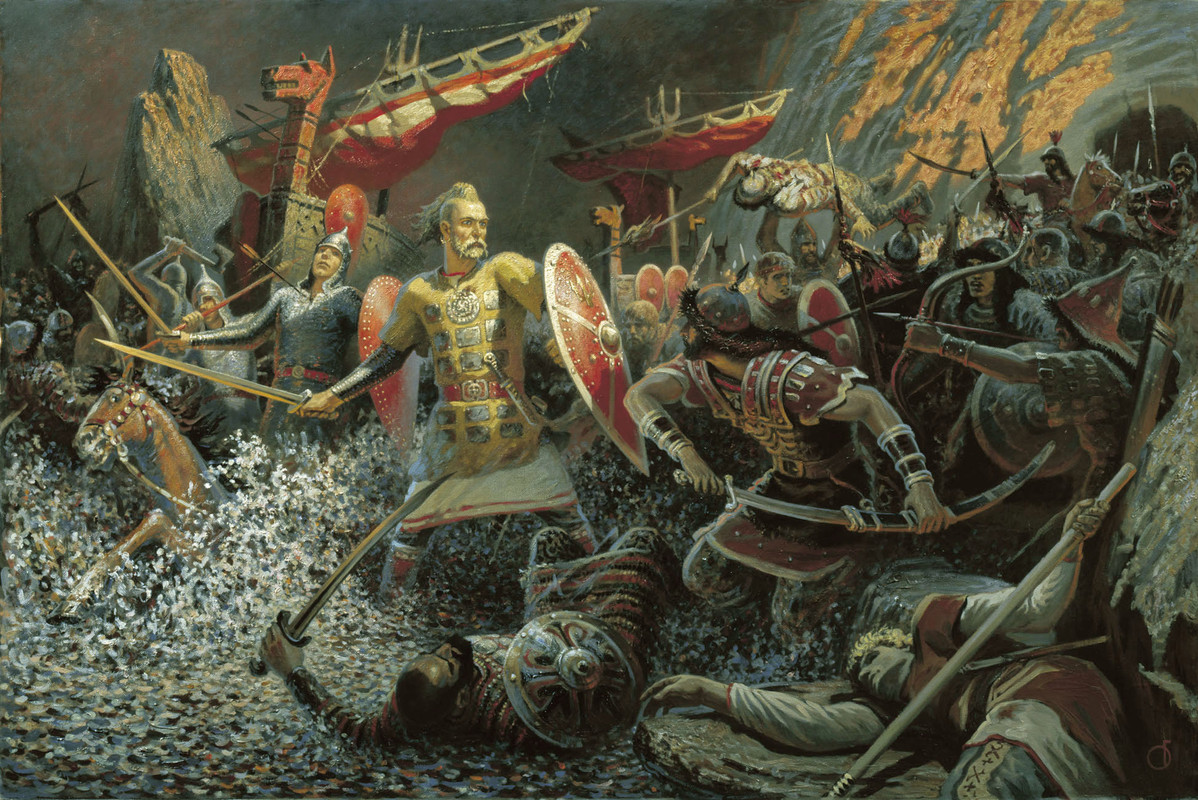
Royal army leaded by the King himself could defeat Khazar forces at the battle of Lejlotka near Voronezh holding. The battle was preceded by skillful manoeuvres - Mikael could catch exhausted enemy army in trap. There are more than 3500 casualties from 11000 soldiers on the side of enemy. King’s army lost only 1100 soldiers. Despite the victory was decisive, it was start of the war not the end. In the coming months khazar forces can regroup and supplied from the steppe. Further they set up an ambush royal army at Petrovsk forests and battle ended in defeat. Mikael’s army was forced to lift the siege of war goal province.
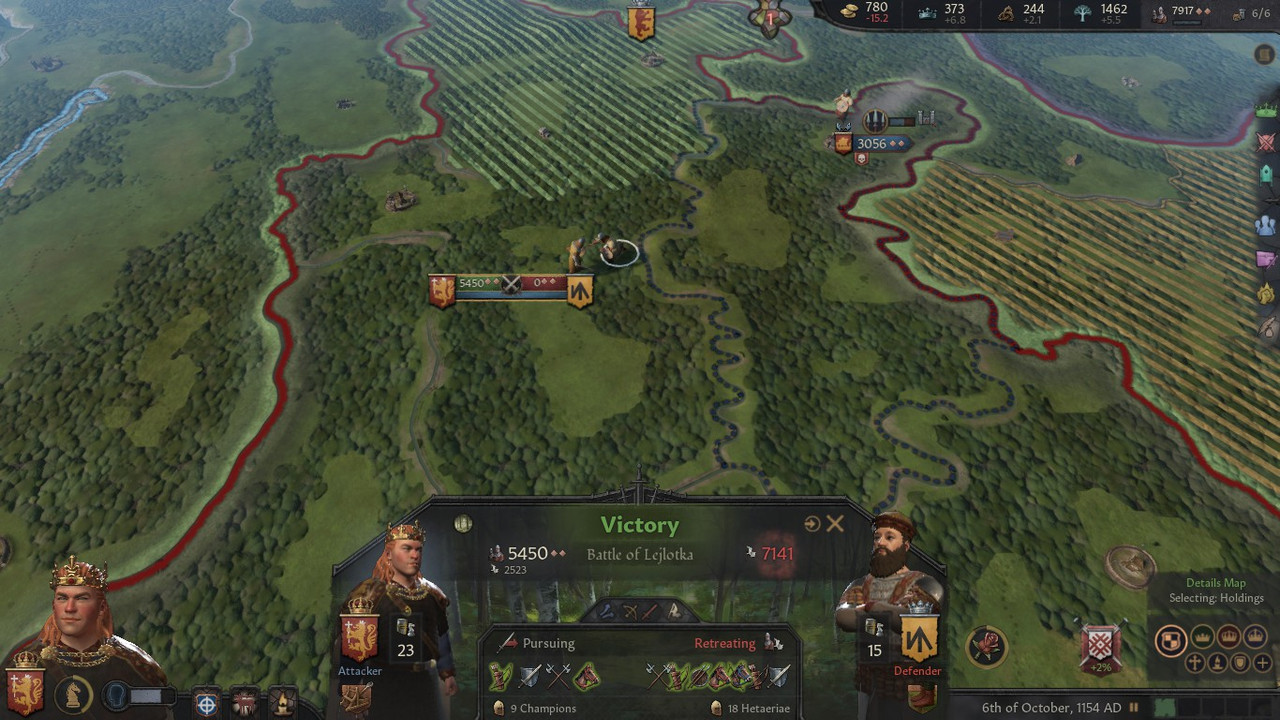
Only after three years of intense skirmishes, tough sieges and maneuvers another decisive battle occurred. The main battle took place near Pavlovsk at the end of winter 1157 AD and marked turning point in the course of war. It was an important event in the conquest of khazar steppe, as it marked the capture of one of the biggest holdings - Tambow. Khopyor was completely broken…. to be danger for the Kingdom again. So the first phase of khazar steppe conquest has been done. However, royal coffers are empty and there is no money to initiate further wars. So the Steward offers to concentrate on the domestic affairs in order to collect at least 300-500 ducats.
Terrible assassination

“My pity wife was murdered indeed! She was so young and beautiful… Alexandra was pregnant when hand of murder killed her. Who can do it?”
“I know, my lord, your brother Mikael has killed her”
“Why has he done so awful thing? I was completely loyal to the kingdom of Vladimir”
“You was loyal as independent king of Novgorod when your father, Tikshayka the Fat was dead.”
“Yes, …. Indeed, after assassination of my wife Mikael has invaded my realm and L have lost the throne”
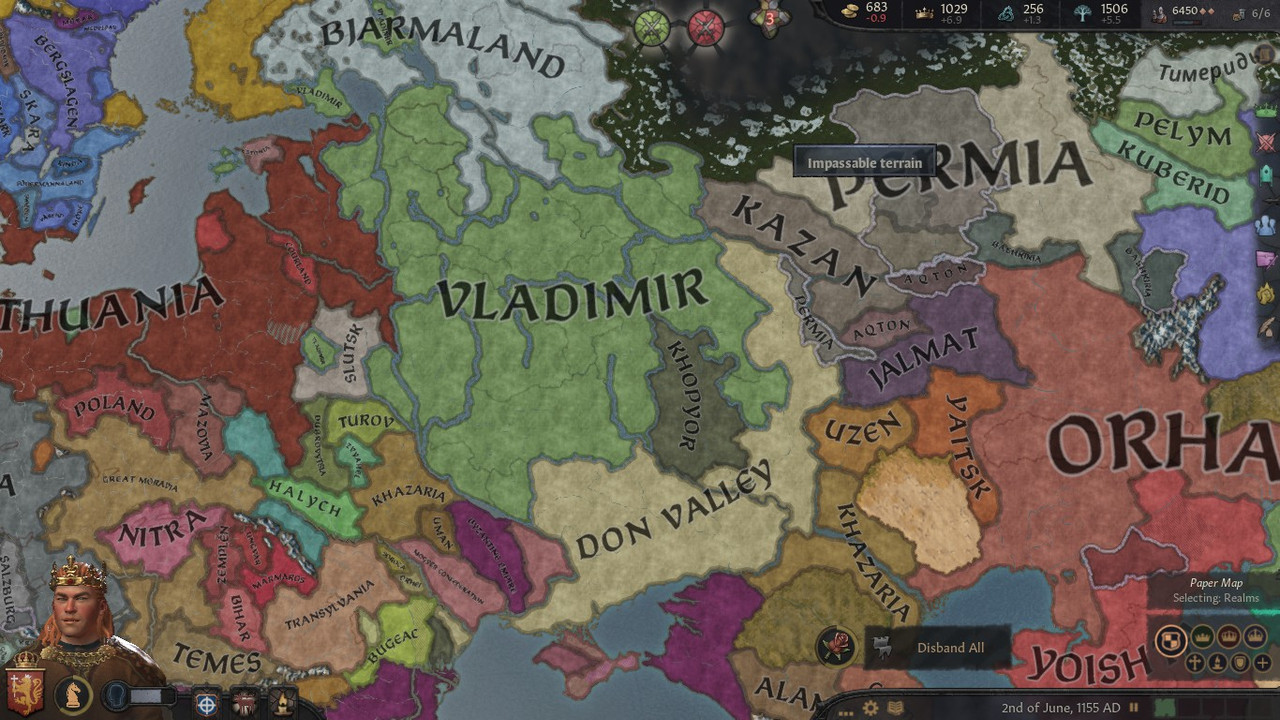
Medieval politics is quite ugly. After the death of old King, Vladimir Kingdom was partitioned by two parts. One part is Vladimir Kingdom inherited by Mikael. Another part is Kingdom of Novgorod inherited by the oldest son of Tikshayka. After the election Vladimir and Hus wife Alexandra travelled to Novgorod, their new home and capital. Due to the fact that Vladimir was marriages with daughter of Lithuanian King, he was sure that Mikael could not easily declare war against him to restore the realm. The Chancellor offers Mikael to behave in other way. Alliance between Novgorod and Lithuania is cemented by the dynastic marriage. If Alexandra is dead, the alliance will be broken and we could easily take Novgorod back. Mikael was an aspiring military leader but not murder. After long exhortations Mikael has agreed with the Chancellor and Alexandra was doomed. This terrible murder of pregnant young women is able to ruin the reputation of Mikael....
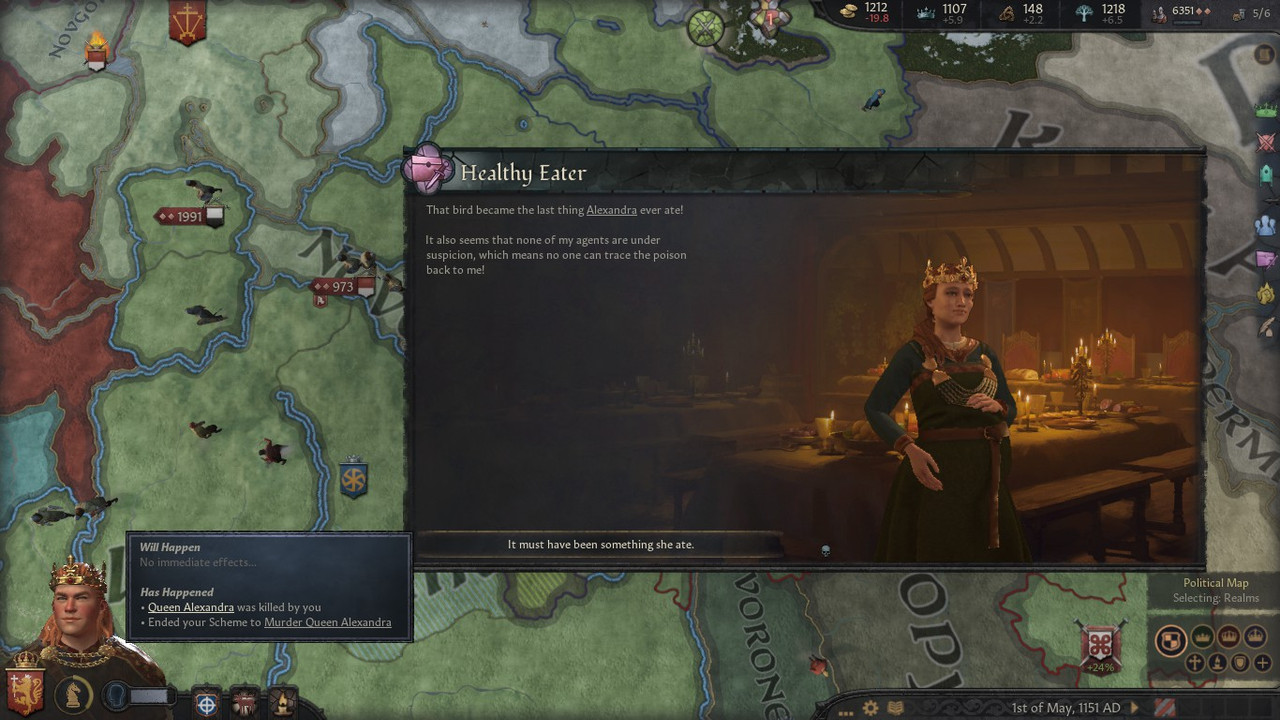
24th of October 1149 AD: Election of King

Chancellor - Jarl Bertil Ingjaldsson of Ryzan
“I am authorized to report you that our beloved King is dead”
“As powerful vassals of Vladimir Kingdomб you have to elect King according to Succession Law”
Steward - Duke Varmanpaz of Obran Osh
“Tikshayka II drew up a will of which we have to execute. The King should be his oldest son - Vladimir. He is a wise talented young man who married the daughter of Lithuania’s King. It gets us a strong powerful alliance with Lithuania Kingdom”
Marshal - Duke Surt II of Luki

“I talk you, It ‘s nothing. Tikshayka the Fat was a fool. He could scarcely conquerer only three Slavic holdings for almost 40 years in power.”
“His son Vladimir is the same weakling that can’t hold a sword!”
“Please, take a look at the realm map in order to understand what kind of King do we need”
Chancellor - Jarl Bertil Ingjaldsson of Ryzan
“I guess, uh… we should listen to the Marshal. As a duke of Ryzan I am afraid of steppe expanses. The only way is to capture them!”
“Well, if… Vladimir didn’t, then who…”
Spymaster - Pakstyan of Chernigov
“Mikael is the best choice… He is brave, strong and fair. Ideal warrior and maybe King”.

This rainy night, the King has been elected. 17 year’s old young man ascends to the throne of vast Suomenko Kingdom of Vladimir. Countries welcomed their young King hoping for his courage and bravery. Vladimir (failed heir) is going to Novgorod, his own small realm formed after the partition of Vladimir Kingdom.
Alexandra, Queen of Novgorod Kingdom, wife of Vladimir
“Don’t worry my beloved husband. Your brother protect us from the steppe hordes. He can repeal possible invasion by Khazar tribes.
“Novgorod is a well-maintained town, its defence is strong. My father also promised protection.”
Vladimir keeps silence.
7th of October 1154 - 2nd March of 1157: steppe military campaign
After inauguration King Mikael the First goes to the troops gathered near the border with Khopyor, a khazar tribe state. Marshal is waiting for him in the easily improvised military camp. More then 8000 solders (royal guard, cavalry and ordinary troops) have been called from all parts of the Realm. The military plan developed by the Council implied decisive battle and siege of vital holdings of Khopyor tribe. Enemy armies should be defeated separately, we have to prevent them connecting together.

Royal army leaded by the King himself could defeat Khazar forces at the battle of Lejlotka near Voronezh holding. The battle was preceded by skillful manoeuvres - Mikael could catch exhausted enemy army in trap. There are more than 3500 casualties from 11000 soldiers on the side of enemy. King’s army lost only 1100 soldiers. Despite the victory was decisive, it was start of the war not the end. In the coming months khazar forces can regroup and supplied from the steppe. Further they set up an ambush royal army at Petrovsk forests and battle ended in defeat. Mikael’s army was forced to lift the siege of war goal province.

Only after three years of intense skirmishes, tough sieges and maneuvers another decisive battle occurred. The main battle took place near Pavlovsk at the end of winter 1157 AD and marked turning point in the course of war. It was an important event in the conquest of khazar steppe, as it marked the capture of one of the biggest holdings - Tambow. Khopyor was completely broken…. to be danger for the Kingdom again. So the first phase of khazar steppe conquest has been done. However, royal coffers are empty and there is no money to initiate further wars. So the Steward offers to concentrate on the domestic affairs in order to collect at least 300-500 ducats.
Terrible assassination

“My pity wife was murdered indeed! She was so young and beautiful… Alexandra was pregnant when hand of murder killed her. Who can do it?”
“I know, my lord, your brother Mikael has killed her”
“Why has he done so awful thing? I was completely loyal to the kingdom of Vladimir”
“You was loyal as independent king of Novgorod when your father, Tikshayka the Fat was dead.”
“Yes, …. Indeed, after assassination of my wife Mikael has invaded my realm and L have lost the throne”

Medieval politics is quite ugly. After the death of old King, Vladimir Kingdom was partitioned by two parts. One part is Vladimir Kingdom inherited by Mikael. Another part is Kingdom of Novgorod inherited by the oldest son of Tikshayka. After the election Vladimir and Hus wife Alexandra travelled to Novgorod, their new home and capital. Due to the fact that Vladimir was marriages with daughter of Lithuanian King, he was sure that Mikael could not easily declare war against him to restore the realm. The Chancellor offers Mikael to behave in other way. Alliance between Novgorod and Lithuania is cemented by the dynastic marriage. If Alexandra is dead, the alliance will be broken and we could easily take Novgorod back. Mikael was an aspiring military leader but not murder. After long exhortations Mikael has agreed with the Chancellor and Alexandra was doomed. This terrible murder of pregnant young women is able to ruin the reputation of Mikael....

Last edited:
- 1
Rivalry between vassals
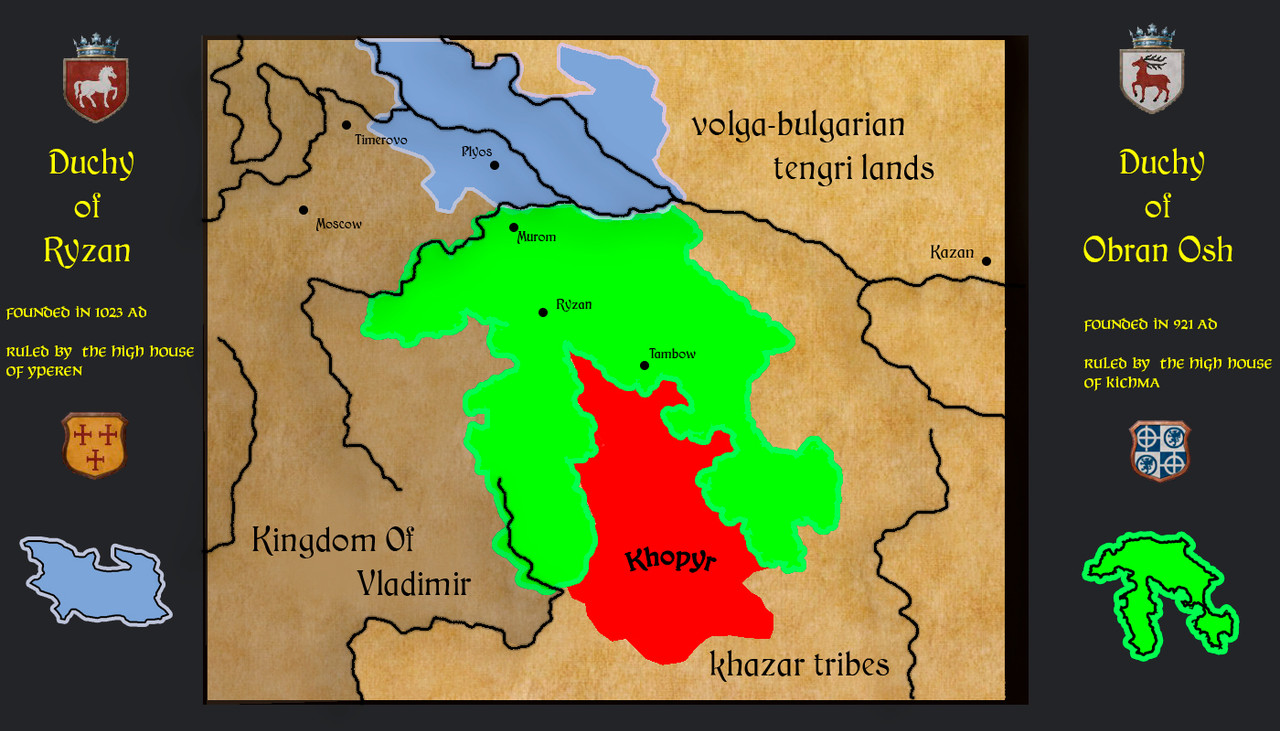
After the last military campaign against khazar tribe, realm coffers were empty and the Steward could persuade young King to delay wars in order to concentrate on the domestic affairs. So there is some time to describe the nature of Vladimir Kingdom: its structure and interior policy. Since the embarrassment of feudal way Vladimir Kingdom has been grounded on power vassals, massive royal guard and alliances inspired by the dynastic marriages. There are five power vassals in the realm: Obran Osh, Ryzan, Chernigov, Luki and Karachev. Keeping the balance between the most powerful among them (Obran Osh and Ryzan) is the core of royal interior policy.
I. Obran Osh
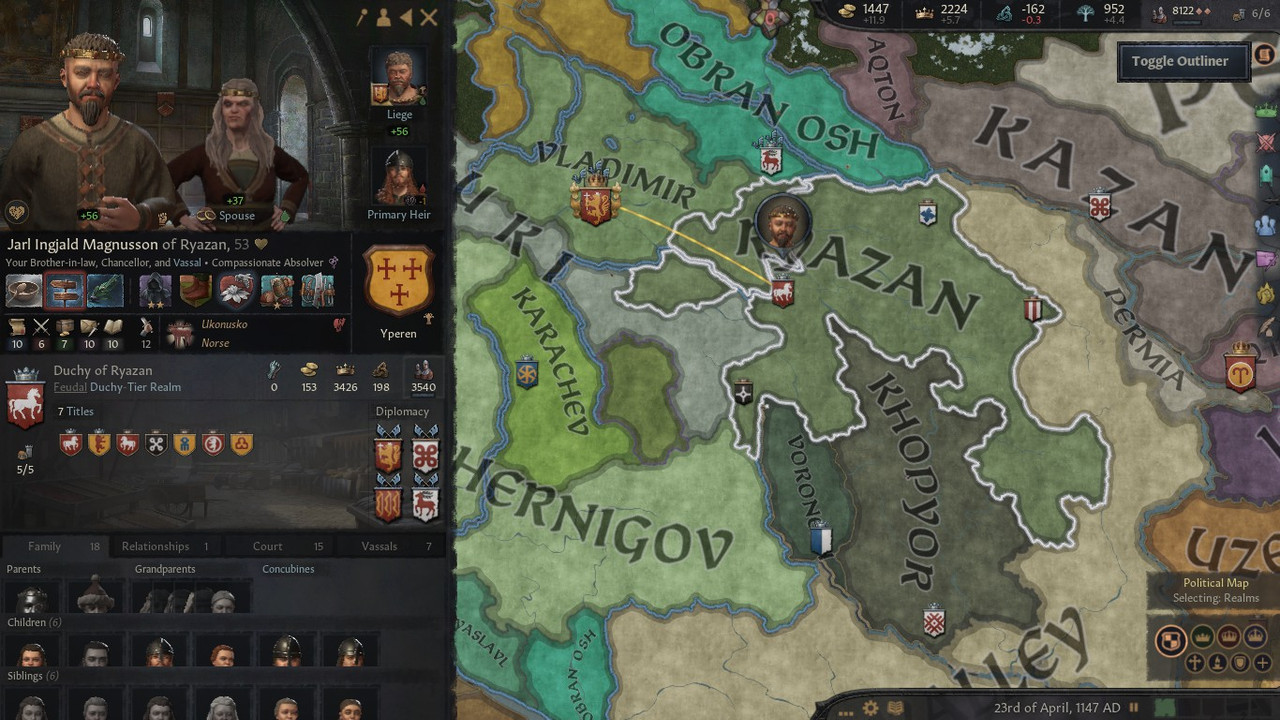
The first power vassal is Obran Osh located on the far north-east of the Kingdom. Duchy of Obran Osh borders tengri faith lands that were owned by Volga Bulgaria in the past. After the collapse of Volga Bulgaria these lands are highly fragmented and pose no danger. Obran Osh is one of the oldest duchies created by High Chieftain of Kezhevat in 921 AD. High Chieftain of Kezhevat granted the title to his youngest son Surt. After unsuccessful attempt of High Chieftain of Orban Orsh (Suni) to claim the throne in the Great civil war, dukes of Orban Orsh are faithful vassals of the King and don’t want to pretend the kingdom anymore.
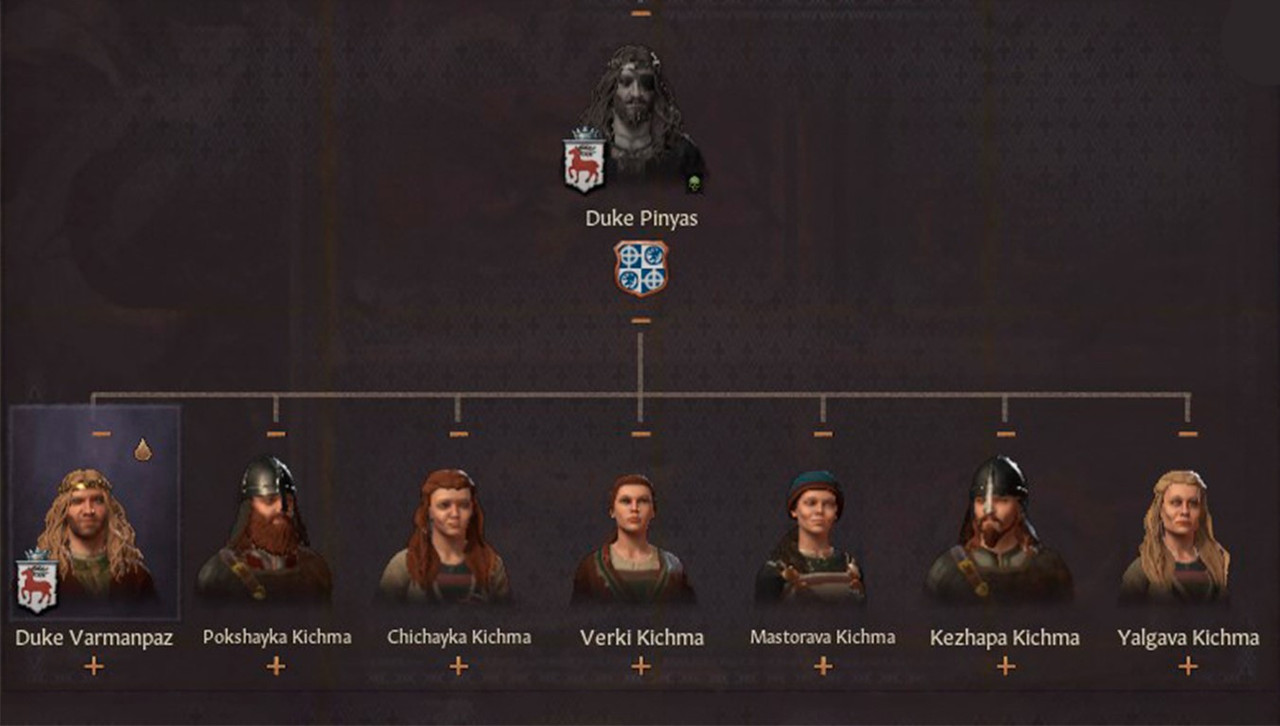
Duke Pinyas decided to form his own Noble House in order to strengthen his position in 1120 AD. New-formed house of Kichma becomes a Cadet Branch of Meryavid Dynasty. The King generously app robed the foundation of cadet branch. Obran Osh is highly feuding with Duchy of Ryzan for Murom count. This count was at first conquered by Suni but after his execution as a rebel the Queen Ashava granted the count back to Ryzan. House of Yperen is an enemy of House of Kichma, so from time to time devastating vassal wars occur.
II. Ryazan

Duchy of Ryazan is the outpost on the South located on the border of northern forests and steppe space. Dukes of Ryazan Harv been stubbornly hold the battlements of steppe hordes. Duchy of Ryazan is granted to the scandinavian House of Yperen. So dukes of Ryazan named "Jarls". The title was created by Tikshayka the Great in 1023 after the subjugation of neighbouring khazar tribes.
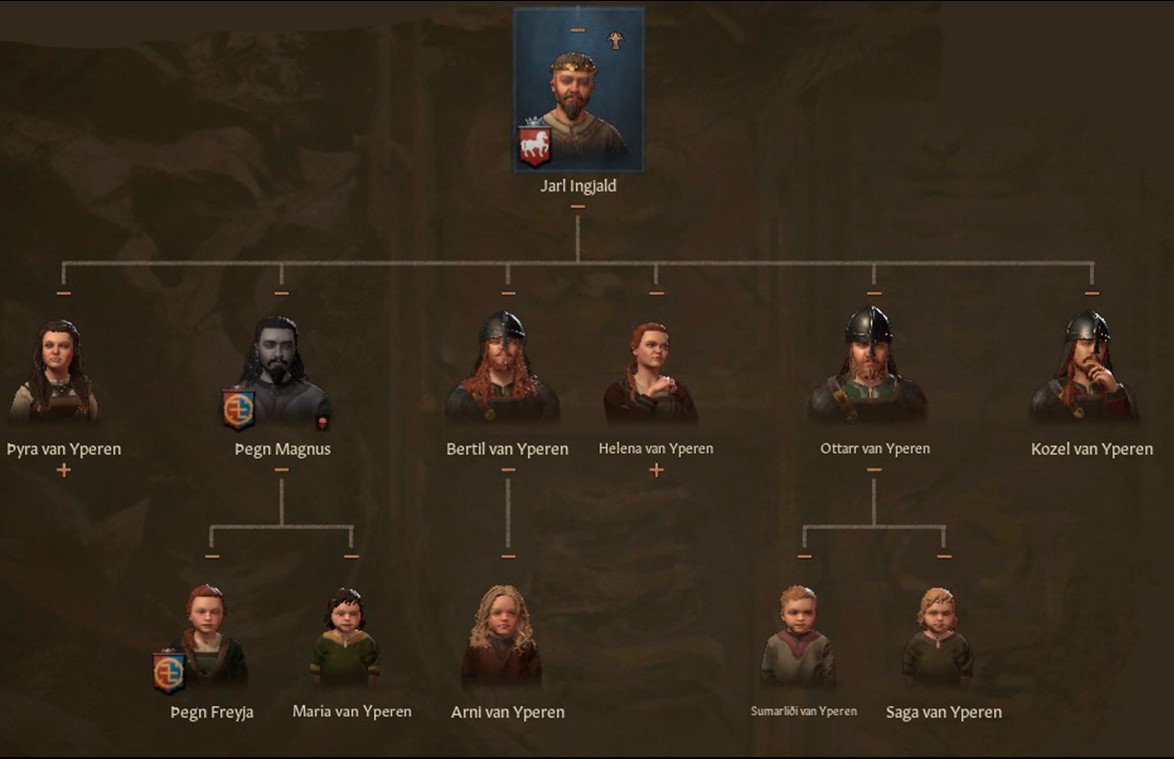
He generously granted the title to one of the prominent and brave champion in the Realm - Otwin Hranesson van Yperen. The house was a scandinavian one whose members had adopted Suomenko faith. It is quite interesting that its founder was a count of Overstrict (Frisian) who conquered that during the vikings invasion in Europe in the 900-s. Nowadays one of the members of Yperen Noble House is chancellor in Thiers count (France). Main goal of Jarls of Yperen is to conquest khazar lands like Voronezh, Khopyor and Don valley. They also desire lands earlier belongs to Volga Bulgaria. Title of Ryzan was partitioned after the death of Jarl Ingjald. His oldest son Bertil inherited the title of Ryzan; the youngest son Ottar takes a new-formed duchy of Mordovia.
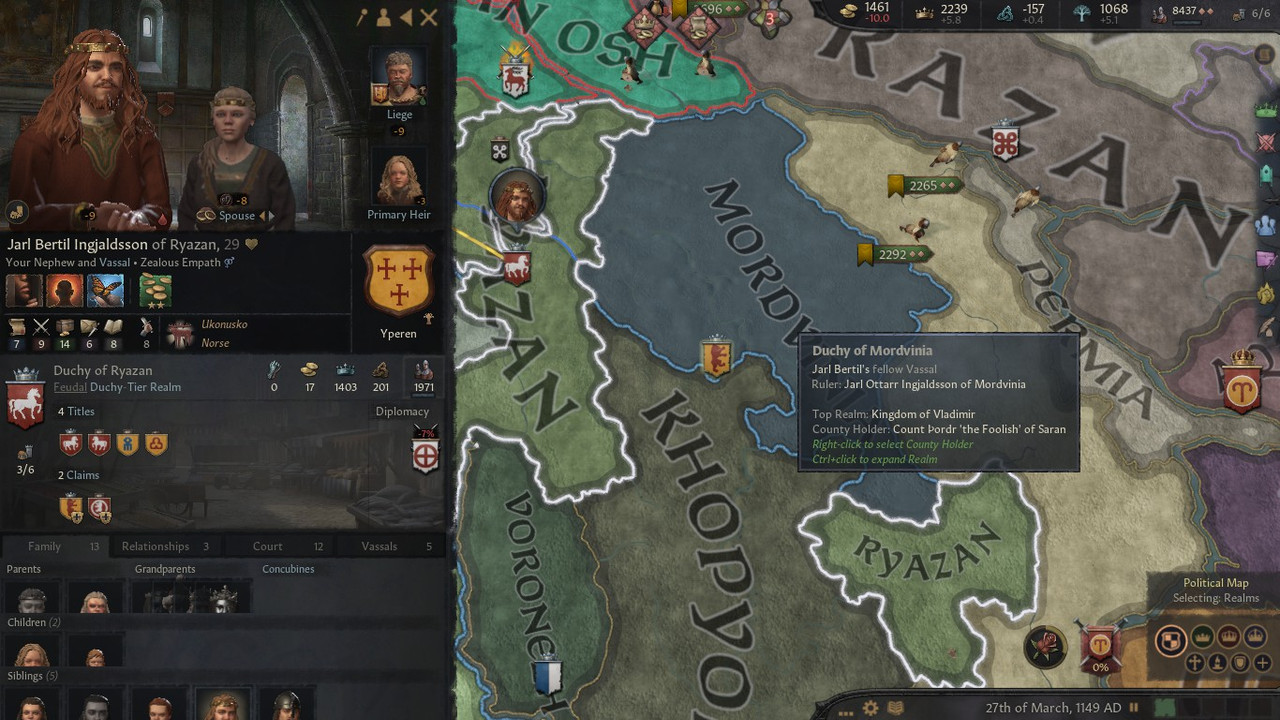
III. Rivalry between Kichma and Yperen Houses.
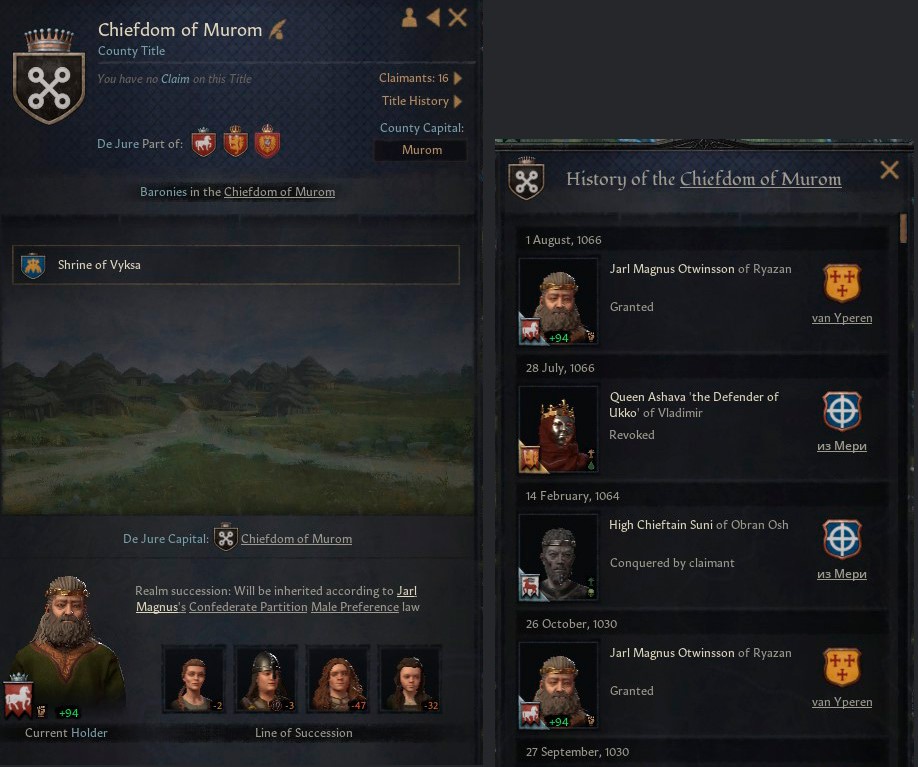
Dukes of Obran Osh rival with Jarls of Ryzan for the count of Murom, Chiefdom of Murom was granted to Jarl Magnus Otwinsson of Ryzan in 1030 AD. Ambitious High Chieftain Suni of Obran Osh cold conquer the Chiefdom in the first vassal war 35 years later. However, after the civil war Suni was executed as a rebel and Chiefdom of Murom was revoked by Ashava and granted back to Jarl Magnus of Ryzan. Apart from Murom Obran Osh and Ryzan have competing interests in Volga region. Following the collapse of Khazar kaganate, dozens of fragmented tribes and clans fill in steppe. Both competing duchies want to subjugate weak and disorganised states in order to strengthen its position. Coalitions of vassals are formed around Obran Osh and Ryzan and it’s very important to keep the balance. King can directly rule up to 6 holdings. So almost the new conquered lands are granted to the vassals in equal manner.
Interesting to see a Flemish noble house having such an influence on the other side of Europe. Little quirks like this are never far away in CK3; part of what makes it so fun!
- 1
World in 1150 AD
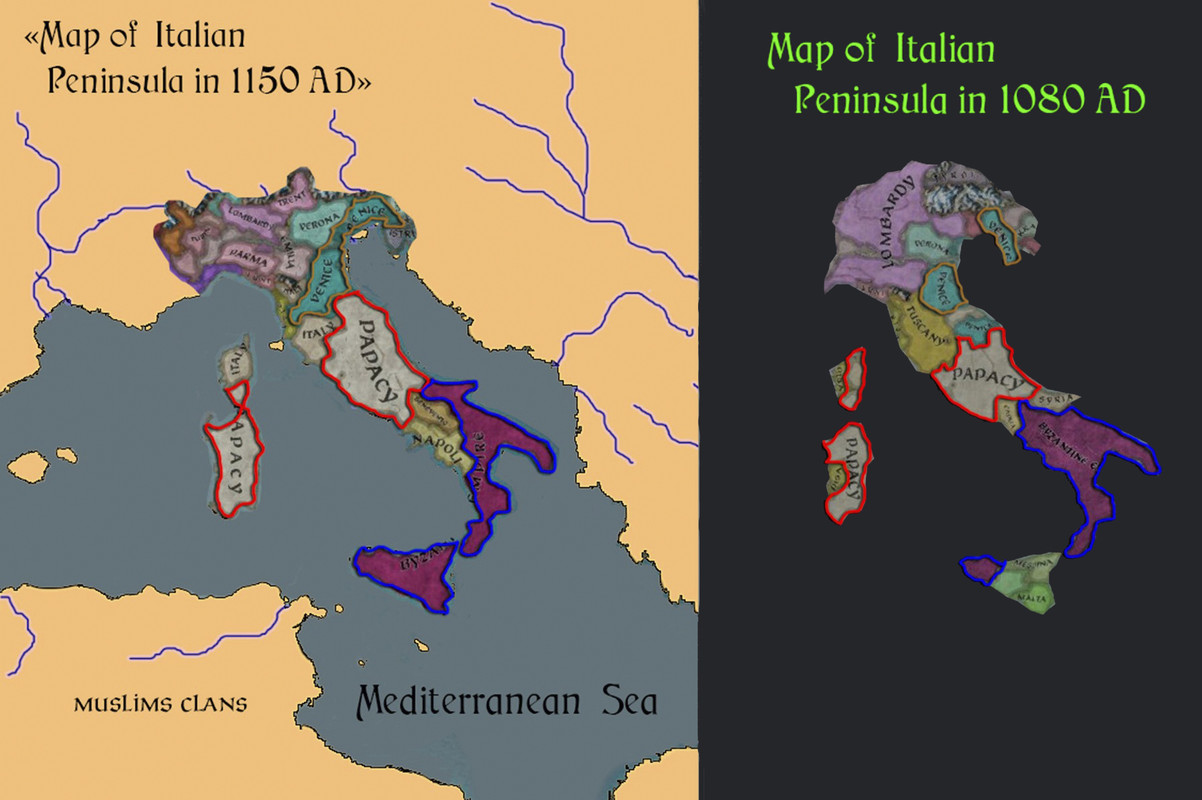
Italian Peninsula is still politically fragmented region. However, Papacy could strengthen its position conquered some important neighboring holdings. Another strong player is Grand Republic of Venice located on the far north of the peninsula. The Republic has subjugated a few of inland provinces. Lombardyand Tuscany have supposedly collapsed. Byzantine Empire consolidated its power on the south conquered entire Sicily. It can be concluded that Papacy will continue consolidationg its holdings. The conflict with Venice is inevitable.
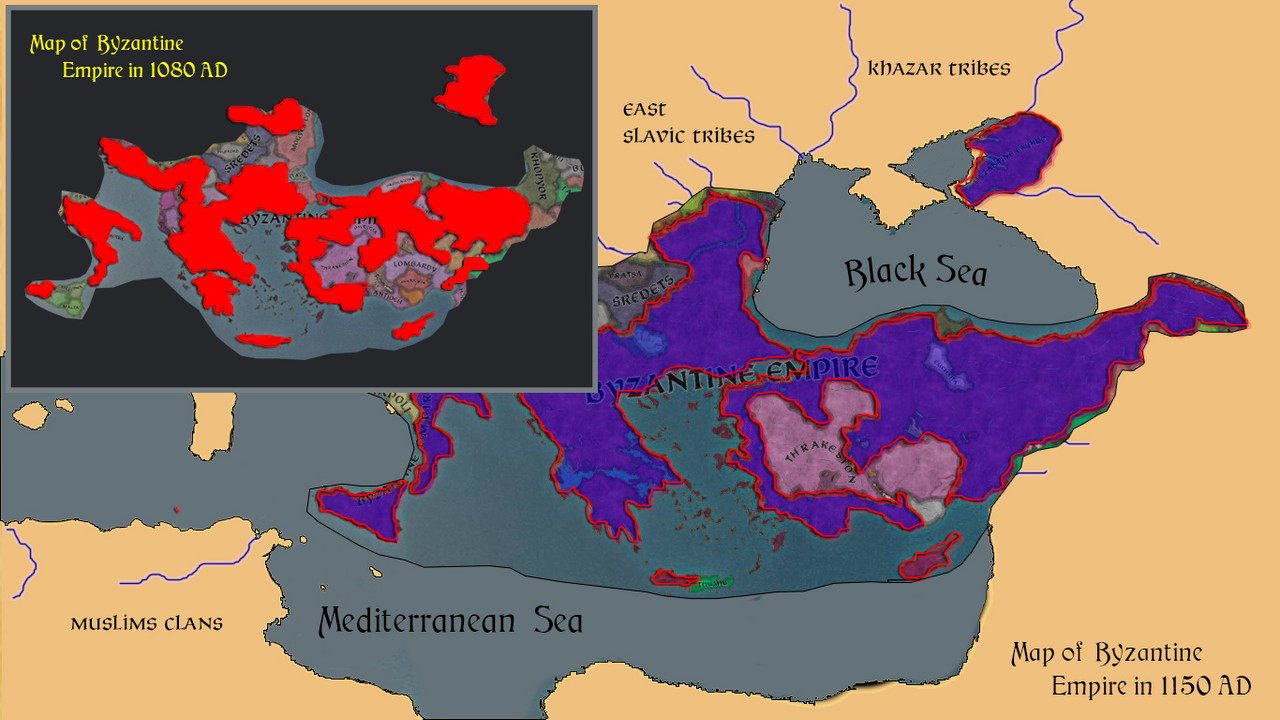
Byzantine Empire rose like a Phoenix from the ashes. The Empire could defeat rival east slavic tribes (Mogyrev confederation), conquer almost half of Caucasus
region and save its inland holdings. Thrakesion is the only competing state in the Asia Minor that can threaten the power of Empire. In this respect, Byzantine Empire remains the most powerful and prominent state in the world of 1150 AD.

Italian Peninsula is still politically fragmented region. However, Papacy could strengthen its position conquered some important neighboring holdings. Another strong player is Grand Republic of Venice located on the far north of the peninsula. The Republic has subjugated a few of inland provinces. Lombardyand Tuscany have supposedly collapsed. Byzantine Empire consolidated its power on the south conquered entire Sicily. It can be concluded that Papacy will continue consolidationg its holdings. The conflict with Venice is inevitable.

Byzantine Empire rose like a Phoenix from the ashes. The Empire could defeat rival east slavic tribes (Mogyrev confederation), conquer almost half of Caucasus
region and save its inland holdings. Thrakesion is the only competing state in the Asia Minor that can threaten the power of Empire. In this respect, Byzantine Empire remains the most powerful and prominent state in the world of 1150 AD.
- 1
Still yet to see the ERE do particularly badly in a CK3 campaign. Seems to be consistently strong.
I hope for the future alliance with Vizantine Empire. We don't have any competing interests. There are still rival khazar tribes between us.You gotta stomp on them early or else they go mad with power.
I am really surprised. The Empire has survived despite the invansion of east slavic tribes. The occupied countryside of Constantinople.Still yet to see the ERE do particularly badly in a CK3 campaign. Seems to be consistently strong.
Chapter VII. Mikael I. His life, reign and the end
Mikael I. His life, reign and the end
(1149 - 1183 AD)
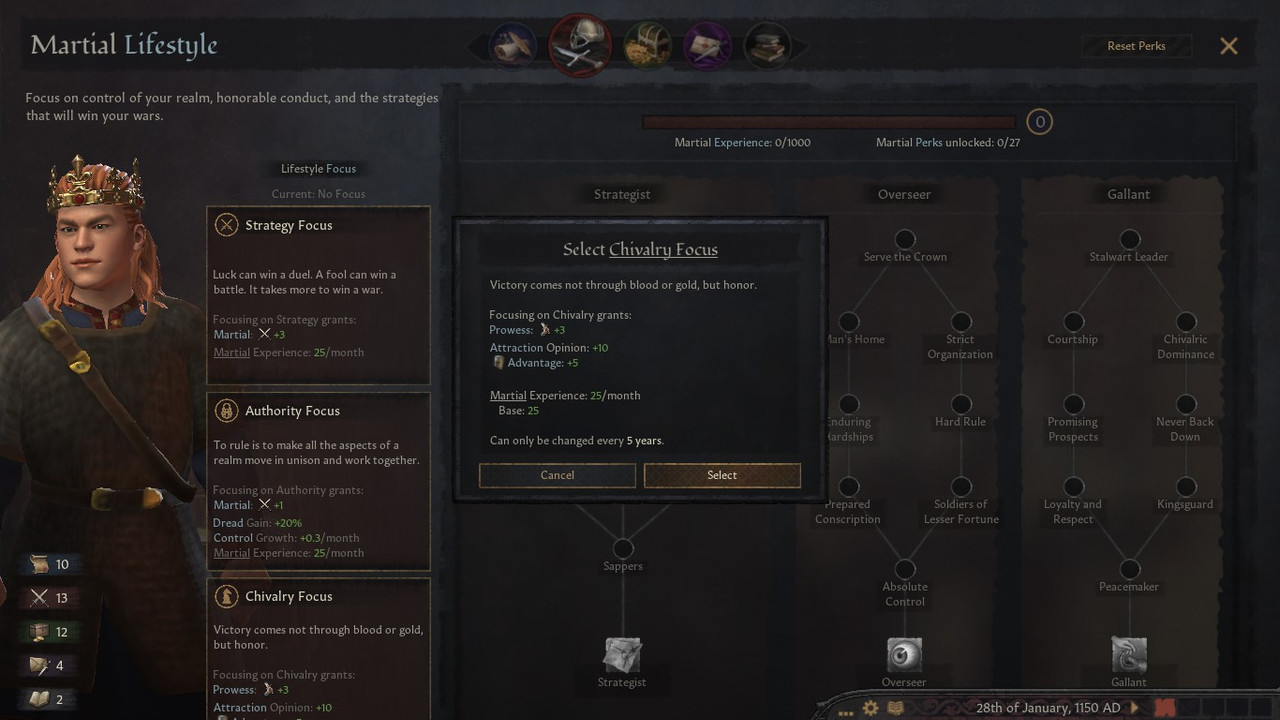
Domestic affairs
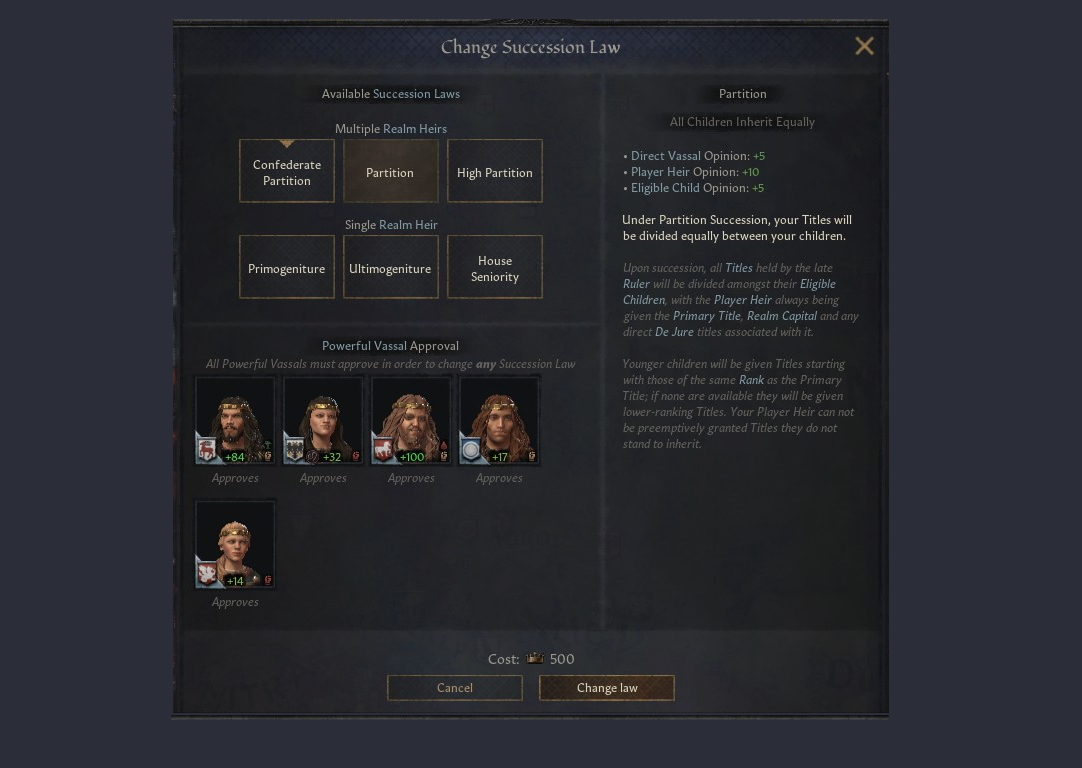
(1149 - 1183 AD)

Mikael became a King in 1149 AD when he was only 17 years old. His father Tikshayka II died after almost 40 years of reign. Mikael was a young and brave man focused on chivalry and war. In the following military campaigns he always leaded himself the royal army and fought among soldiers and khights. All his life was full of battles, sieges and conquests. The main goals of the expansion were Kiev, fortified castle and rich holding in the land of east slaves, and the Khopyr, the bastion of rival khazar tribes in the steppe region.
Gates of Kiev
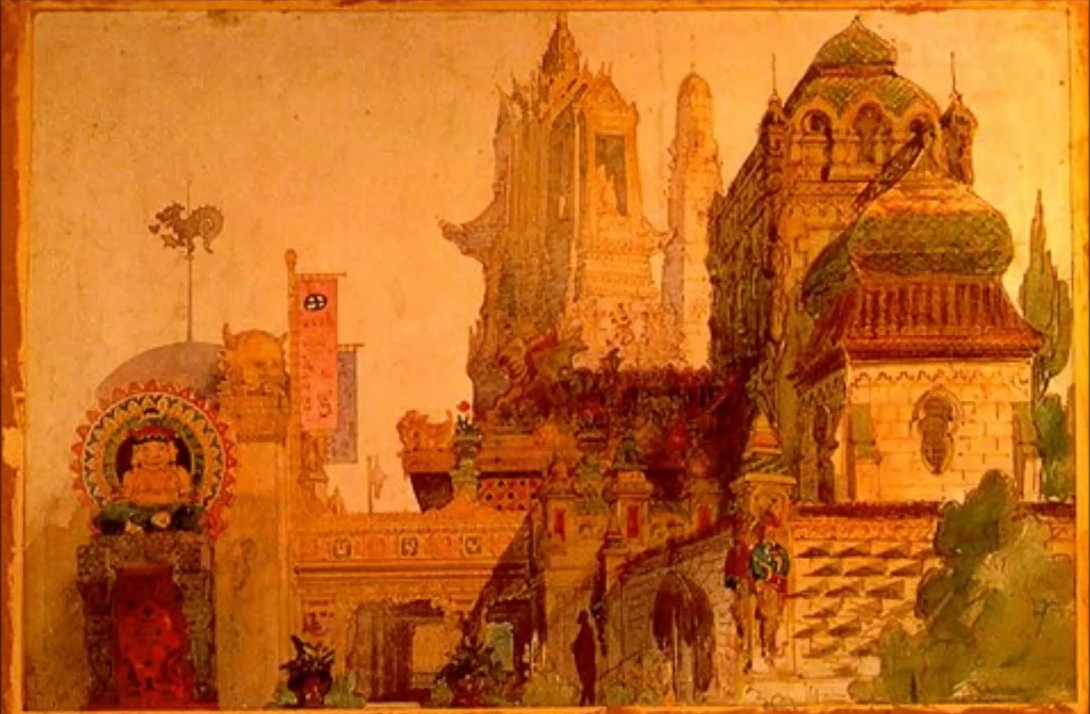
Kiev was conquered by Vladimir Kingdom in the winter of 1167 AD. The Count of Kiev was a large and rich holding ruled by east slavic tribes. The strategic value of Kiev was its location atthe intersection of trade routes between the Steppe, Byzantium Empire and East Europe. Initially Kiev belonged to a pagan slovenian tribesnamed Mogyrev Confederation, that was so strong as it settled nearby Constantinople. As Byzantium Empire was becoming stronger, slovenian tribes had lost their strength and been completely subjugated by khazar tribes. Further khazar tribes forced east slavic to convert into Kabarite Faith. Conquest of Kiev has leaded to fruitful relation between Byzantine Empire and Vladimir Kingdom. A lot of noble families apprenticed their child to Byzantium clerics, traders and warriors. And some of them decided to convert into Orthodox Christianity.
Finland campaign
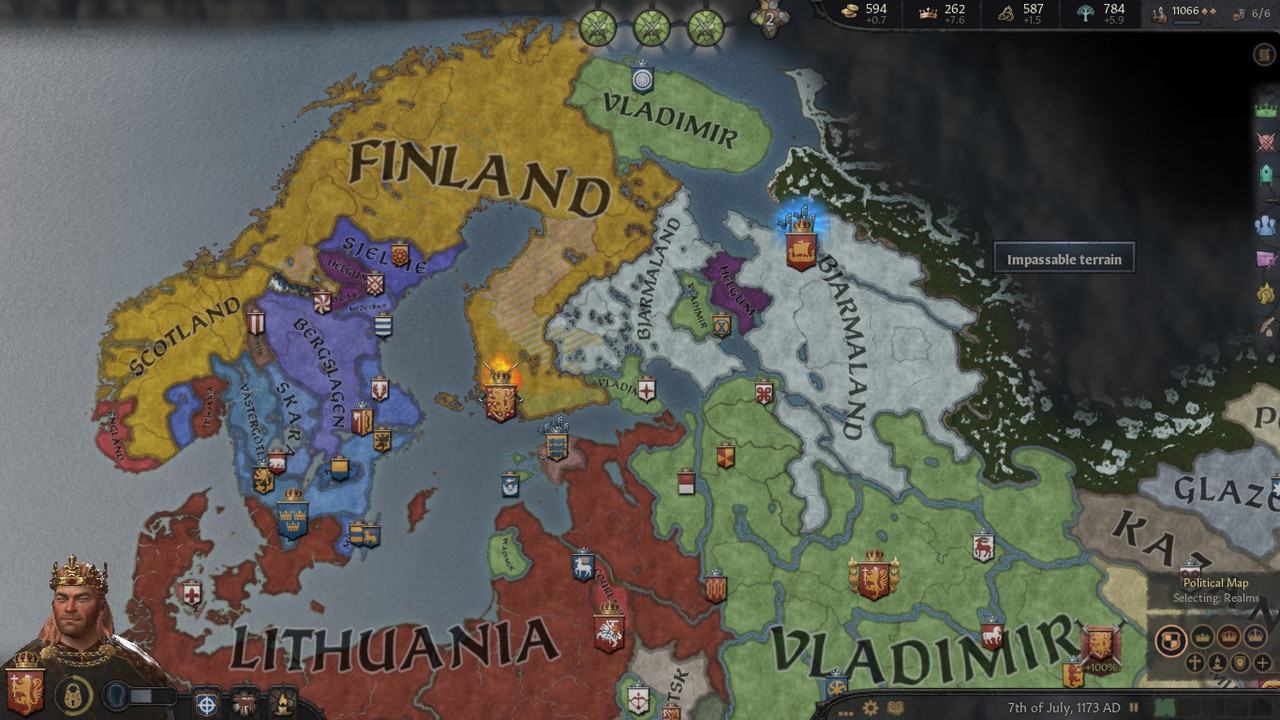
Mikael took part in the war between Bjarmaland and Finland kingdoms in 1173 AD. His father-in-law called Vladimir Kingdom in the war for Finland subjugation. Throughout set of battlefields the royal troops demonstrated their power and high qualified tactics. The war was successive and Finland was reunited under the single crown. That didn’t bring any lands to the Kingdom but our army has got some useful practice. Mikael established himself also as a reliable ally in addition to strengthen his position in the Baltic region.
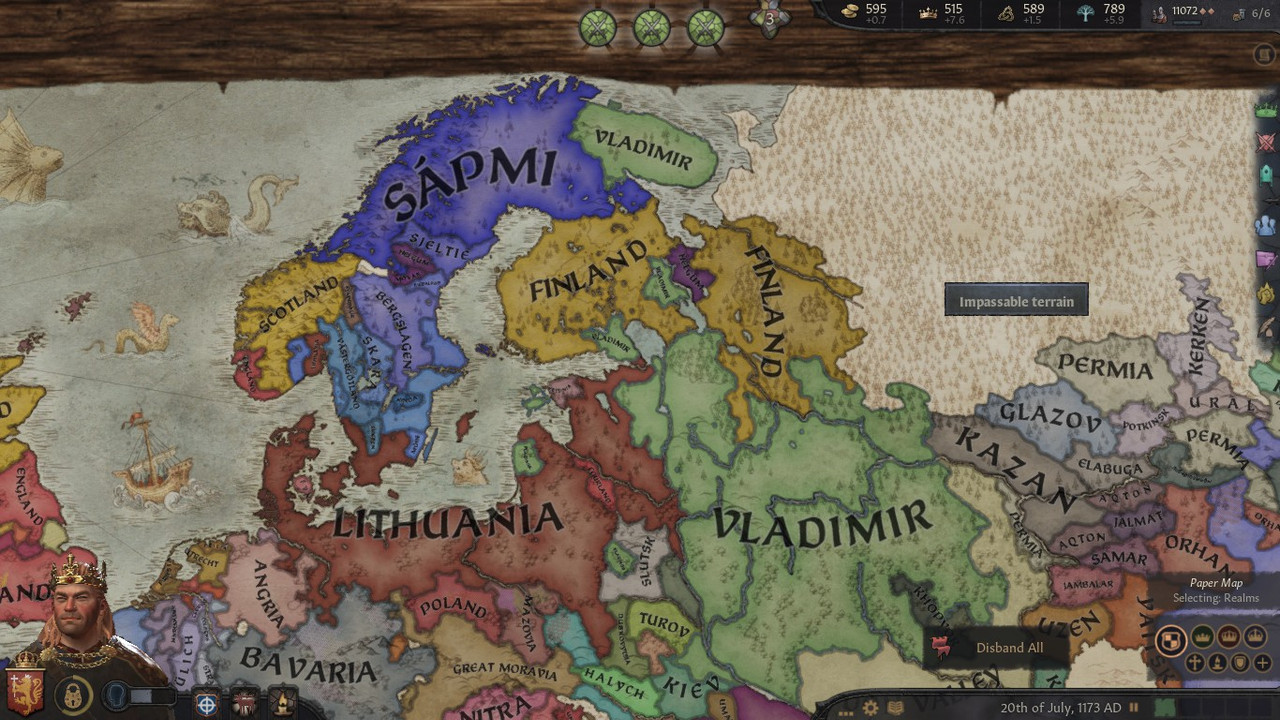
Gates of Kiev

Kiev was conquered by Vladimir Kingdom in the winter of 1167 AD. The Count of Kiev was a large and rich holding ruled by east slavic tribes. The strategic value of Kiev was its location atthe intersection of trade routes between the Steppe, Byzantium Empire and East Europe. Initially Kiev belonged to a pagan slovenian tribesnamed Mogyrev Confederation, that was so strong as it settled nearby Constantinople. As Byzantium Empire was becoming stronger, slovenian tribes had lost their strength and been completely subjugated by khazar tribes. Further khazar tribes forced east slavic to convert into Kabarite Faith. Conquest of Kiev has leaded to fruitful relation between Byzantine Empire and Vladimir Kingdom. A lot of noble families apprenticed their child to Byzantium clerics, traders and warriors. And some of them decided to convert into Orthodox Christianity.
Finland campaign

Mikael took part in the war between Bjarmaland and Finland kingdoms in 1173 AD. His father-in-law called Vladimir Kingdom in the war for Finland subjugation. Throughout set of battlefields the royal troops demonstrated their power and high qualified tactics. The war was successive and Finland was reunited under the single crown. That didn’t bring any lands to the Kingdom but our army has got some useful practice. Mikael established himself also as a reliable ally in addition to strengthen his position in the Baltic region.

Domestic affairs

Mikael implemented a set of very important reforms in a way to ensure prosperity for the Kingdom. First of all, the Scandinavian Succession Law (1167 AD) was eliminated and since that the Throne will have been inheriting only by Meri House. There will be no more any election in the Kingdom! Mikael then granted Grand City of Novgorod (1163 AD) huge privileges that made the city a republic. He thought that republics are more faithful to the Crown then ordinary vassals. In the following years Mikael founded Holy Suomenko Order (1176 AD) for military assistance in holy wars. The Holy order has strengthened Suomenko Faith and recruited many high-skilled and religiously-motivated warriors.
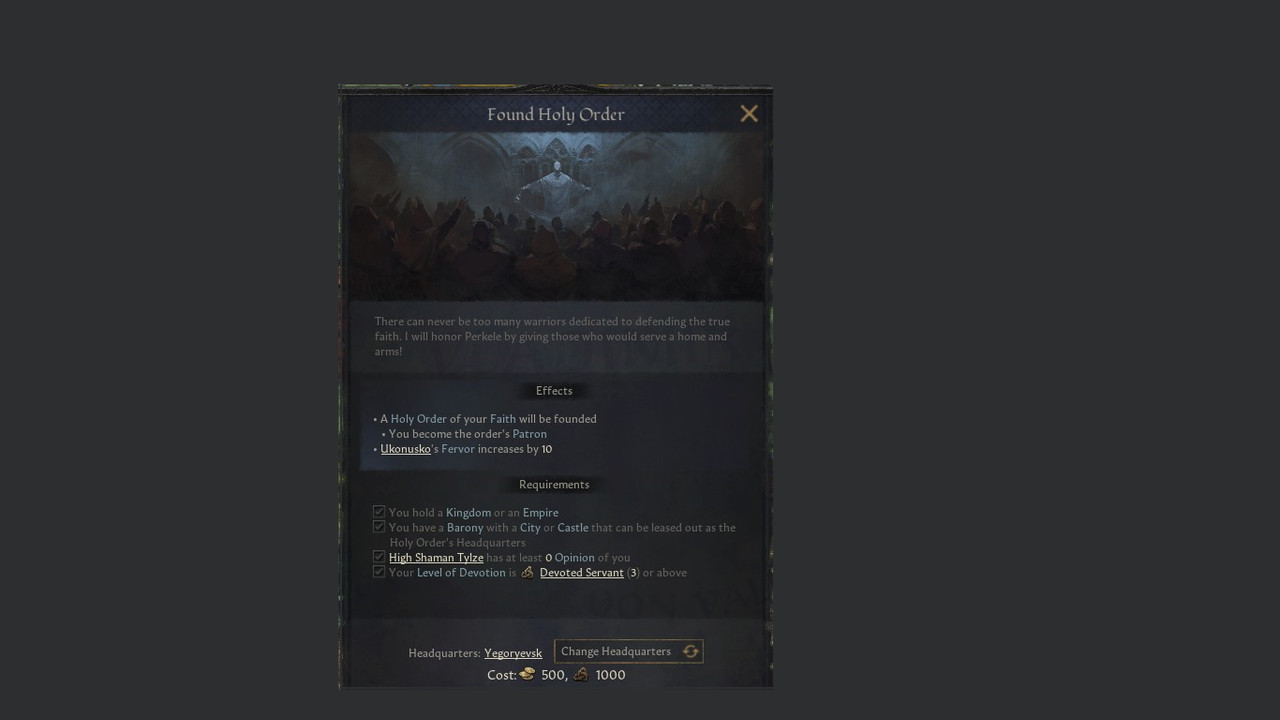
Love affairs
Mikael was truly beautiful and charming man who always attracted women. When he was a heir, Mikael arrived at the court of Finland's King. He got acquired with Tuulikki, pretty girl who was betrothed with the King. They fell in love despite an obvious danger to be executed for betrayal. After the death of the King, Mikael invited Tuulikki to his own court and made her a concubine. Their romance lasted for almost 15 years.
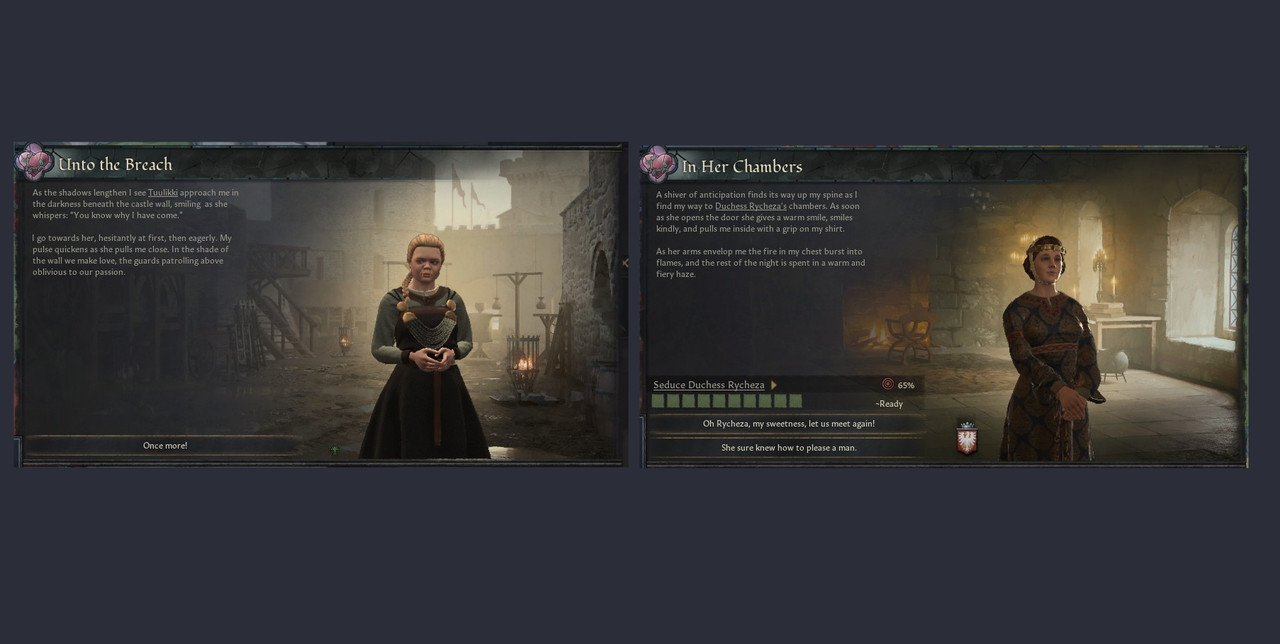
However, not long before his death Mikael fall in love with Duchess of Rycheza who governed Mazovia, a small and last independent slovenian state. Mazovia located between Catholic Poland and Kabarite Lithuania. The Duchess was desperately seeking for any ally who can protect the Duchy from rival neighbours. Mikael was eager to restrain as Catholic as Kabarite. In this way he married his sons to daughters of the Duchess. They liked each other, but their plans were not destined to come up…
Death from Typhus
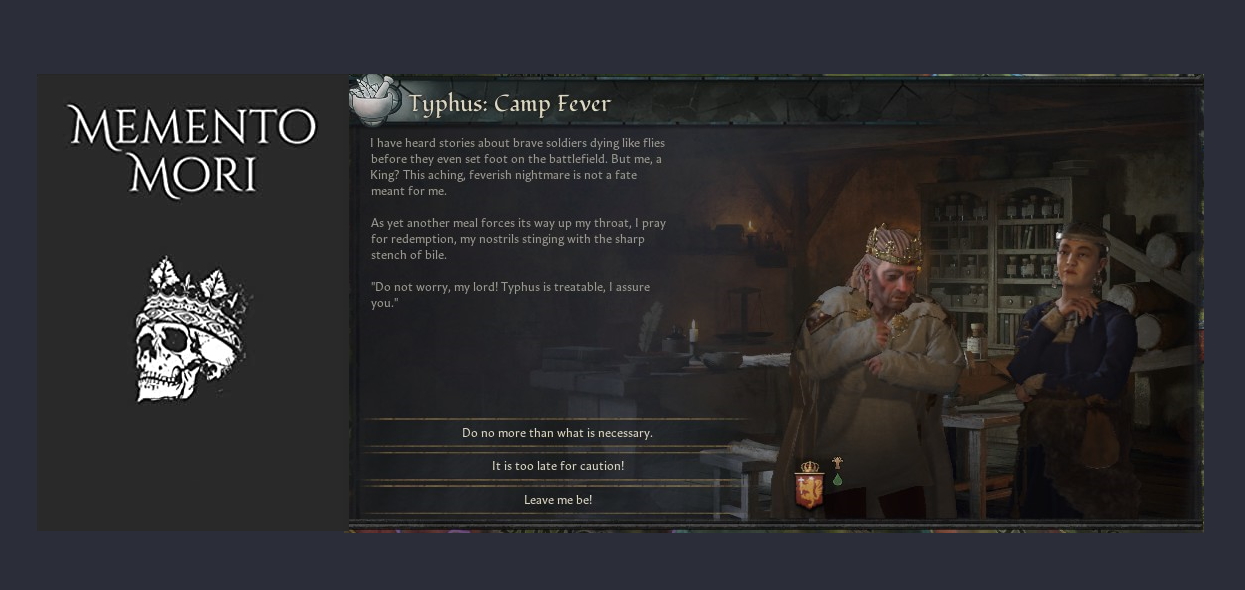
The road from Mazovia to Moscow takes a lot of times. So Mikael decides to inspect military camps around Kiev along the way. The King was satisfied with quality of troops and fortifications. After the inspection he went further to Moscow. However near Smolensk Mikael became seriously ill and had two operations. Unfortunately, treatment was not successful and on 27 th of September 1183 AD the King died. Following new Succession Law the Kingdom was equally partitioned between sons of Mikael. Petri inherited the main title (Vladimir Kingdom), Izaslav got the Kingdom of Novgorod and White Rus was inherited by Mark.
P.S. Heir
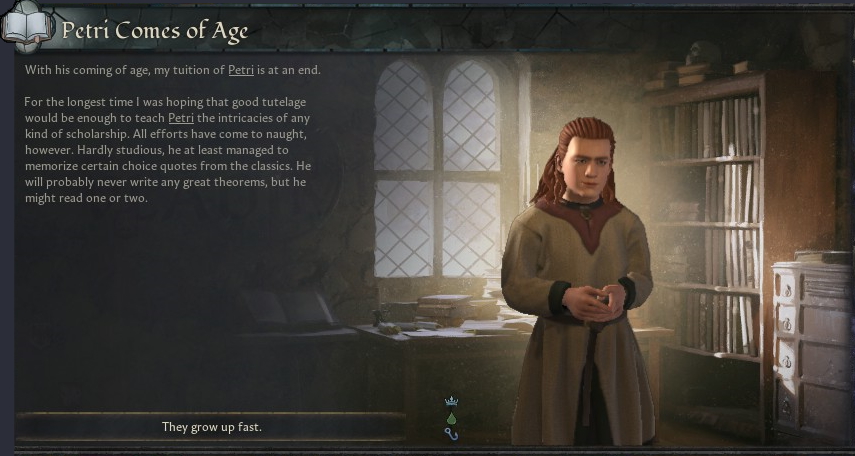
He was not charming, brave and honest as his father. From the childhood Perri interested in scholarship, so his father invited high qualified mentors from the Byzantium Empire to educate his oldest child. Mentors have taught the Heir Byzantium how to intrigue. One old clirics sayed: “You do not have to fight your enemy on the battlefield, you can kill him smoothly and calmly without huge causalities and risk”
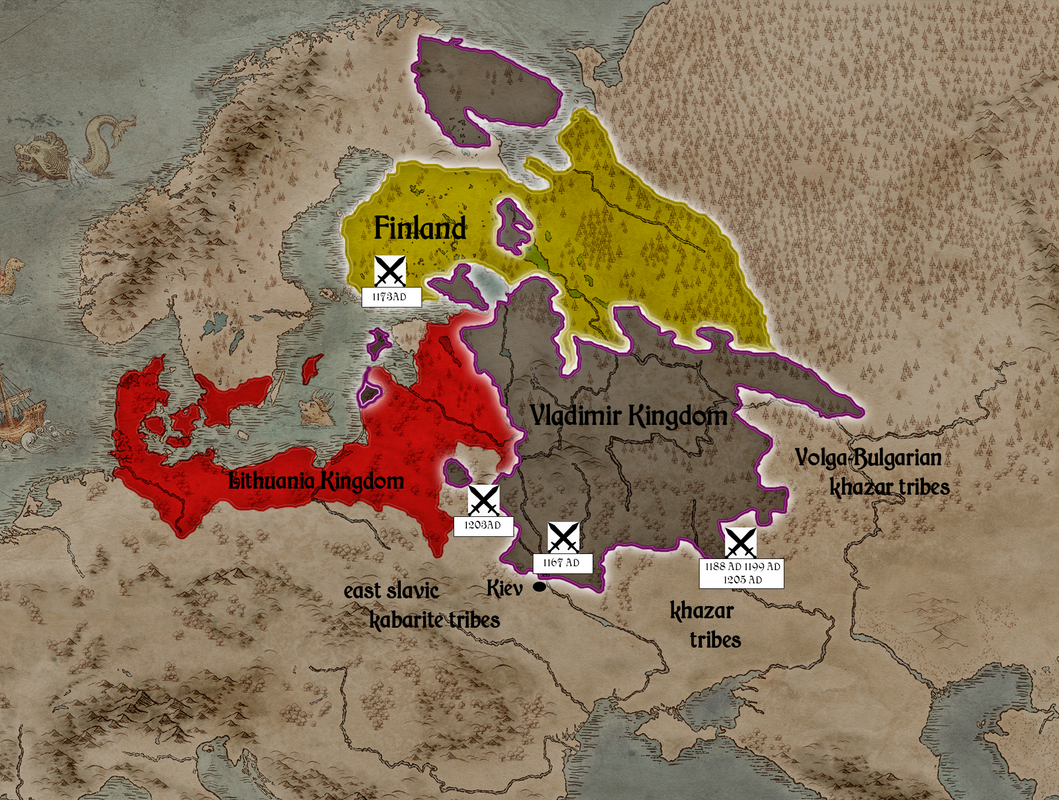

Love affairs
Mikael was truly beautiful and charming man who always attracted women. When he was a heir, Mikael arrived at the court of Finland's King. He got acquired with Tuulikki, pretty girl who was betrothed with the King. They fell in love despite an obvious danger to be executed for betrayal. After the death of the King, Mikael invited Tuulikki to his own court and made her a concubine. Their romance lasted for almost 15 years.

However, not long before his death Mikael fall in love with Duchess of Rycheza who governed Mazovia, a small and last independent slovenian state. Mazovia located between Catholic Poland and Kabarite Lithuania. The Duchess was desperately seeking for any ally who can protect the Duchy from rival neighbours. Mikael was eager to restrain as Catholic as Kabarite. In this way he married his sons to daughters of the Duchess. They liked each other, but their plans were not destined to come up…
Death from Typhus

The road from Mazovia to Moscow takes a lot of times. So Mikael decides to inspect military camps around Kiev along the way. The King was satisfied with quality of troops and fortifications. After the inspection he went further to Moscow. However near Smolensk Mikael became seriously ill and had two operations. Unfortunately, treatment was not successful and on 27 th of September 1183 AD the King died. Following new Succession Law the Kingdom was equally partitioned between sons of Mikael. Petri inherited the main title (Vladimir Kingdom), Izaslav got the Kingdom of Novgorod and White Rus was inherited by Mark.
P.S. Heir

He was not charming, brave and honest as his father. From the childhood Perri interested in scholarship, so his father invited high qualified mentors from the Byzantium Empire to educate his oldest child. Mentors have taught the Heir Byzantium how to intrigue. One old clirics sayed: “You do not have to fight your enemy on the battlefield, you can kill him smoothly and calmly without huge causalities and risk”

- 1
Threadmarks
View all 22 threadmarks
Reader mode
Reader mode


